Nevada Documents
Quitclaim Deed
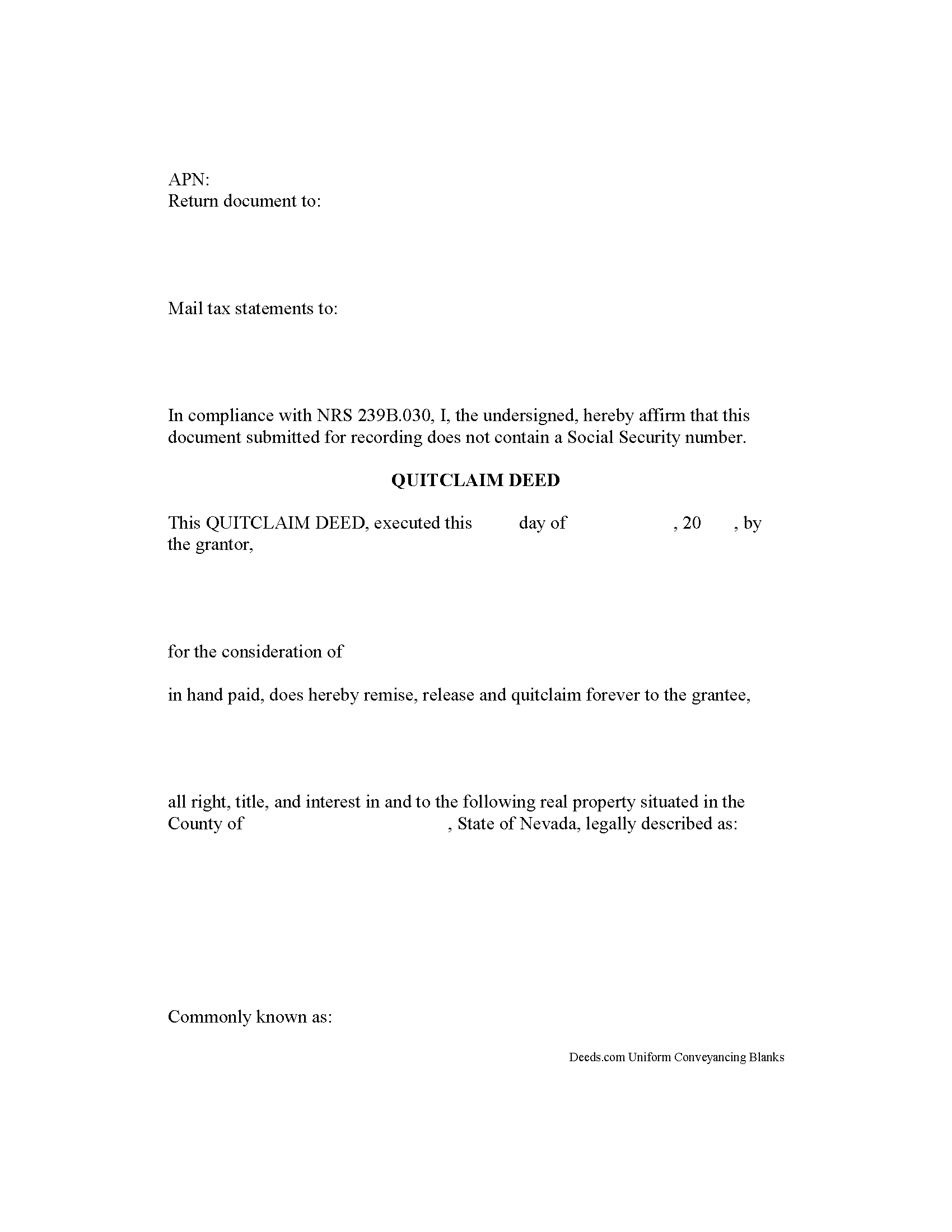
A conveyance by quitclaim deed must be signed by the grantor and acknowledged or proved in a manner permissible by the Nevada Revised Statutes (NRS 111.105). The document must be recorded in the county where the property is located. A county recorder in Nevada may refuse a quitclaim deed for recordation and filing if it does not contain the mailing address of the grantee, the assessor's parcel number assigned to the real property, and the name and address of the person to whom a statement of taxes will be mailed. This is not an exhaustive list of requirements. Please read the Nevada Revised Statutes Property Rights and Transactions title for a complete list of recording requirements for quitclaim deeds.
Recording a quitclaim deed in Nevada serves to provide notice to third persons (NRS 111.315). An unrecorded quitclaim deed is valid only between the parties to the conveyance. Further, an unrecorded quitclaim deed is void against a subsequent purchaser, in good faith and for a valuable consideration, of the same real property (or portion thereof), for which his/her conveyance is first duly recorded (NRS 111.325). Once a quitclaim deed is acknowledged or proved and certified, an... More Information about the Nevada Quitclaim Deed
Gift Deed
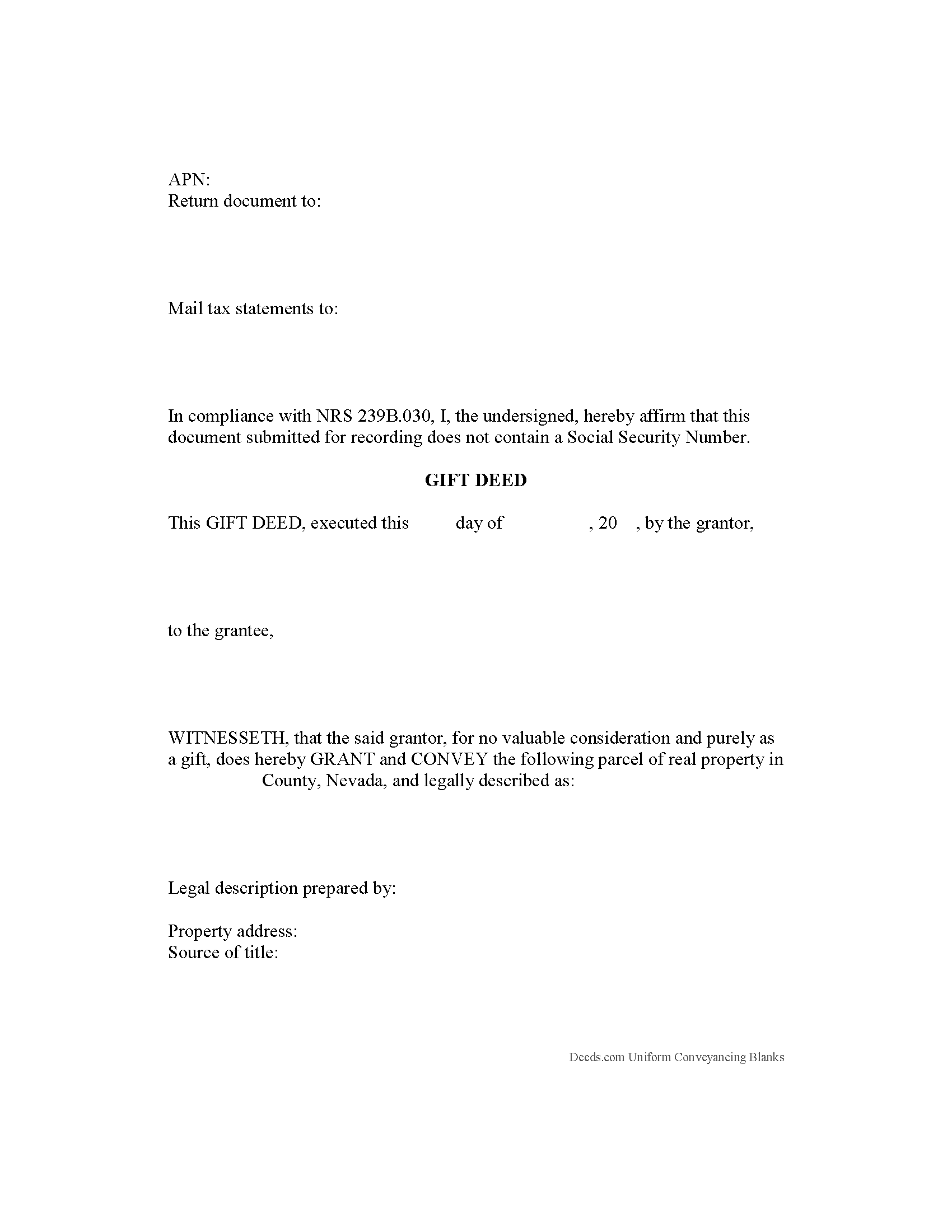
Gifts of Real Property in Nevada
A gift deed, or deed of gift, is a legal document voluntarily transferring title to real property from one party (the grantor or donor) to another (the grantee or donee). A gift deed typically transfers real property between family or close friends. Gift deeds are also used to donate to a non-profit organization or charity. The deed serves as proof that the transfer is indeed a gift and without consideration (any conditions or form of compensation).
Valid deeds must meet the following requirements: The grantor must intend to make a present gift of the property, the grantor must deliver the property to the grantee, and the grantee must accept the gift. Gift deeds must contain language that explicitly states no consideration is expected or required, because any ambiguity or reference to consideration can make the deed contestable in court. A promise to transfer ownership in the future is not a gift, and any deed that does not immediately transfer the interest in the property, or meet any of the aforementioned requirements, can be revoked [1].
A lawful gift deed must also include the grantor's full name and marital status, as well as the gr... More Information about the Nevada Gift Deed
Warranty Deed
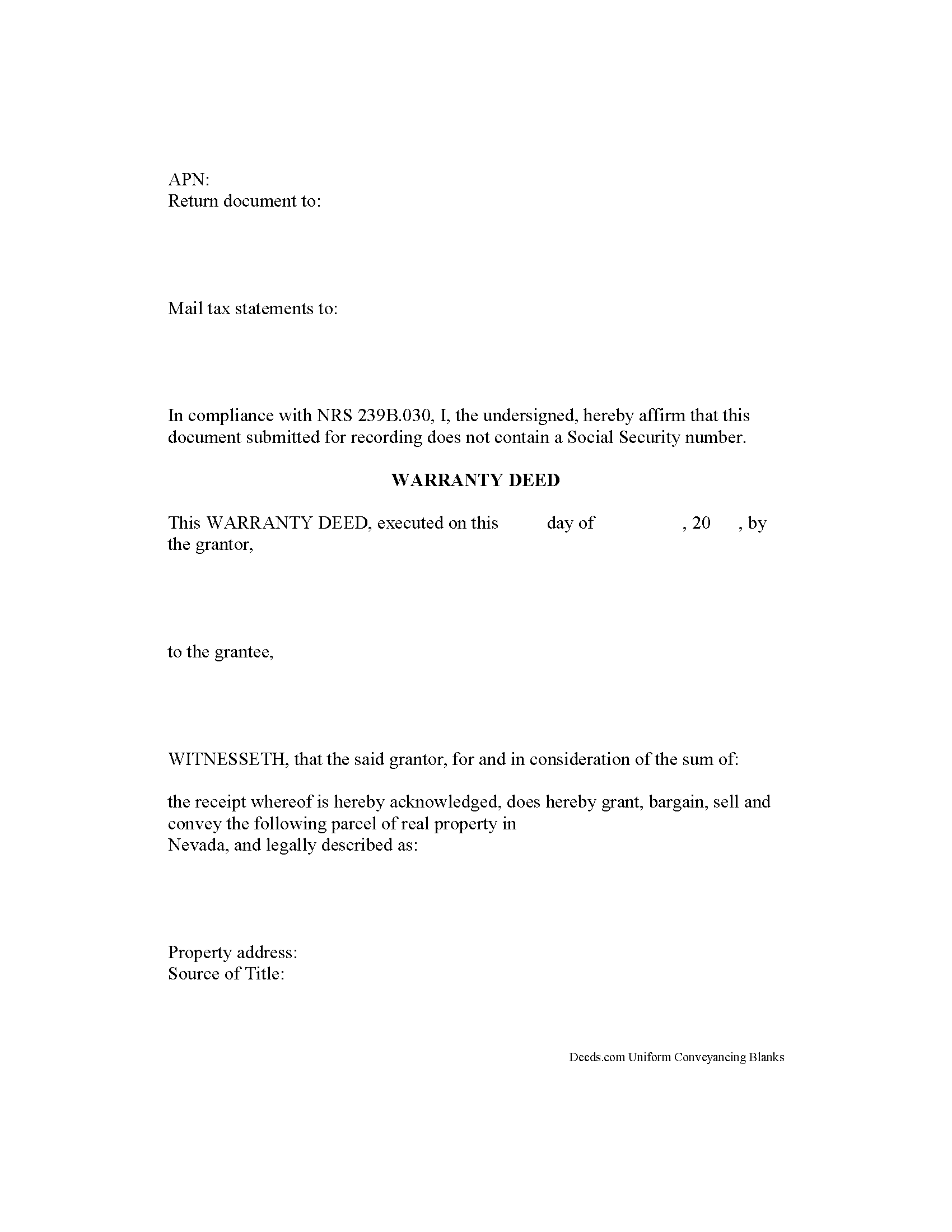
A conveyance of lands or of any estate or interest therein in Nevada can be made by a deed in writing. A warranty deed is a type of real estate deed that can be used in a conveyance of real property. There is no statutory form for a deed in Nevada. In a warranty deed, the grantor warrants that he or she owns clear title to the property and that the property can be conveyed. This type of deed also contains warranties against encumbrances, except for those disclosed to the buyer, and a covenant of further assurances. A warranty deed will, unless specific language in the deed prohibits it, pass the grantor's after-acquired title.
A warranty deed must be signed by the person from whom the estate or interest is intended to pass (the grantor), acknowledged or proved, and recorded as directed by the Nevada Revised Statutes. The proof or acknowledgment of a warranty deed, if proved or acknowledged within the state, is to be taken before one of the following persons: a judge or clerk of a court having seal, a notary public, or a justice of the peace (NRS 111.265). A certificate of the acknowledgment of a warranty deed or the proof of execution thereof, signed by the person taking acknow... More Information about the Nevada Warranty Deed
Special Warranty Deed
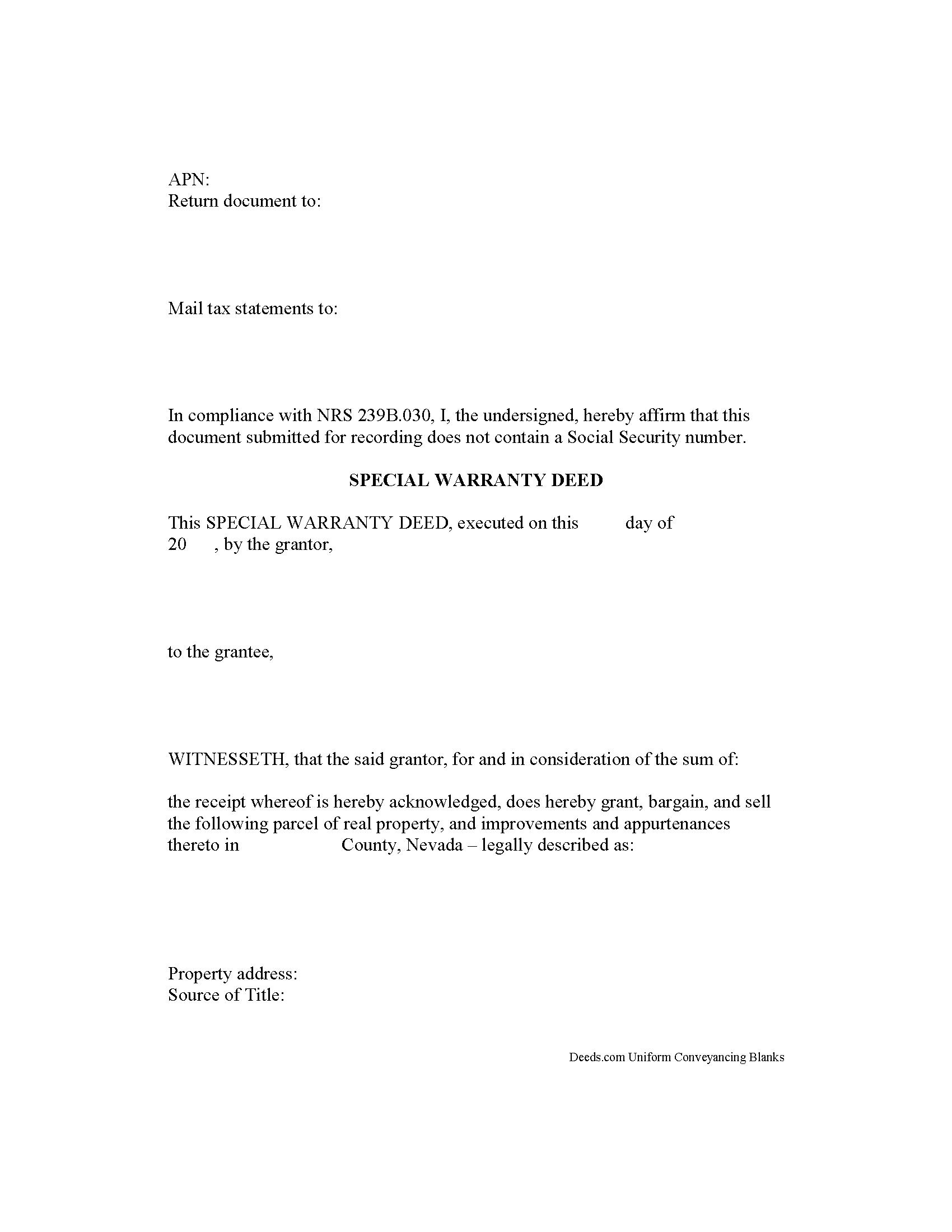
A special warranty deed can be used to convey title to real property in Nevada. The special warranty deed must conform to the statutory requirements for a conveyance of real property.
A special warranty deed must be signed by the person from whom the estate or interest is intended to pass (the grantor), acknowledged or proved, and recorded as directed by the Nevada Revised Statutes. The proof or acknowledgment of a special warranty deed in Nevada is to be taken before one of the following persons: a judge or clerk of a court having seal, a notary public, or a justice of the peace (NRS 111.265). A certificate of the acknowledgment or the proof of execution thereof, signed by the person taking acknowledgment or proof of the deed, and under the seal or stamp of that person will entitle the instrument to be recorded (NRS 111.310). A Declaration of Value must accompany any deed submitted for recording.
Every special warranty deed and every instrument of writing setting forth an agreement to convey real property, or whereby any real property may be affected, that is acknowledged and certified as prescribed by Nevada Revised Statutes must be recorded in the office of the county re... More Information about the Nevada Special Warranty Deed
Grant Deed
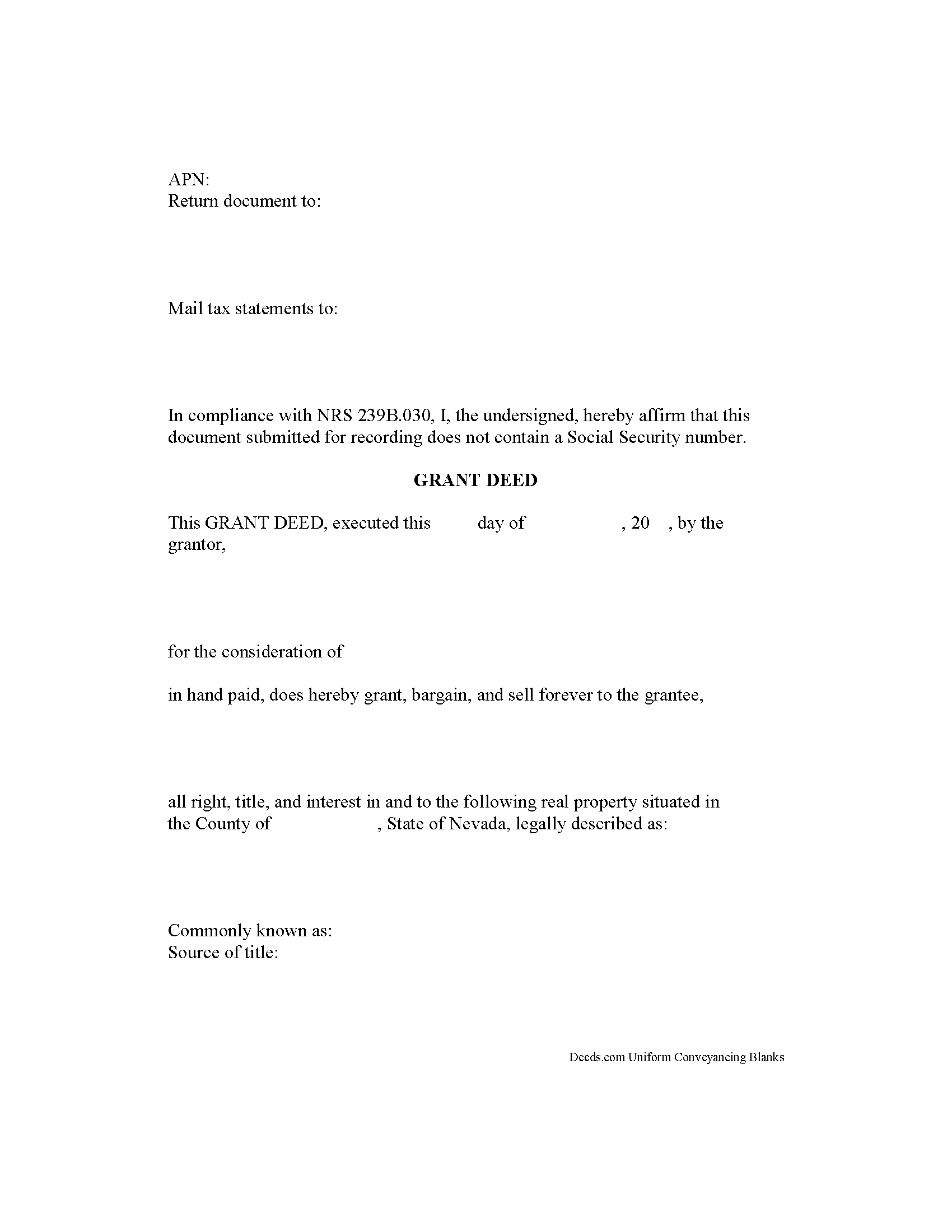
A grant, bargain, and sale deed is commonly used in Nevada for a conveyance of real property. There is not a statutory form for this deed, but the Nevada Statutes provide relevant terms and rules of construction. The following covenants are implied by the use of the words "grant, bargain, and sell" in a conveyance by which an estate of inheritance or fee simple is to be passed: (1) Previous to the time of execution of the conveyance, the grantor has not conveyed the same property, or any right, title, or interest, to any person other than the grantee, and (2) that the real property is, at the time of execution of the conveyance, free from encumbrances done, made, or suffered by the grantor, or any person claiming under the grantor (NRS 111.170). If a person purports to convey property and does not at the time of such conveyance have the legal estate in the property but will acquire it afterwards, the legal estate subsequently acquired by the grantor will pass to the grantee (NRS 111.160).This type of deed does not offer the same covenants of warranty as a warranty deed.
Before a grant, bargain, and sale deed can be recorded as directed by the Nevada Revised Statutes, it must be... More Information about the Nevada Grant Deed
Easement Deed
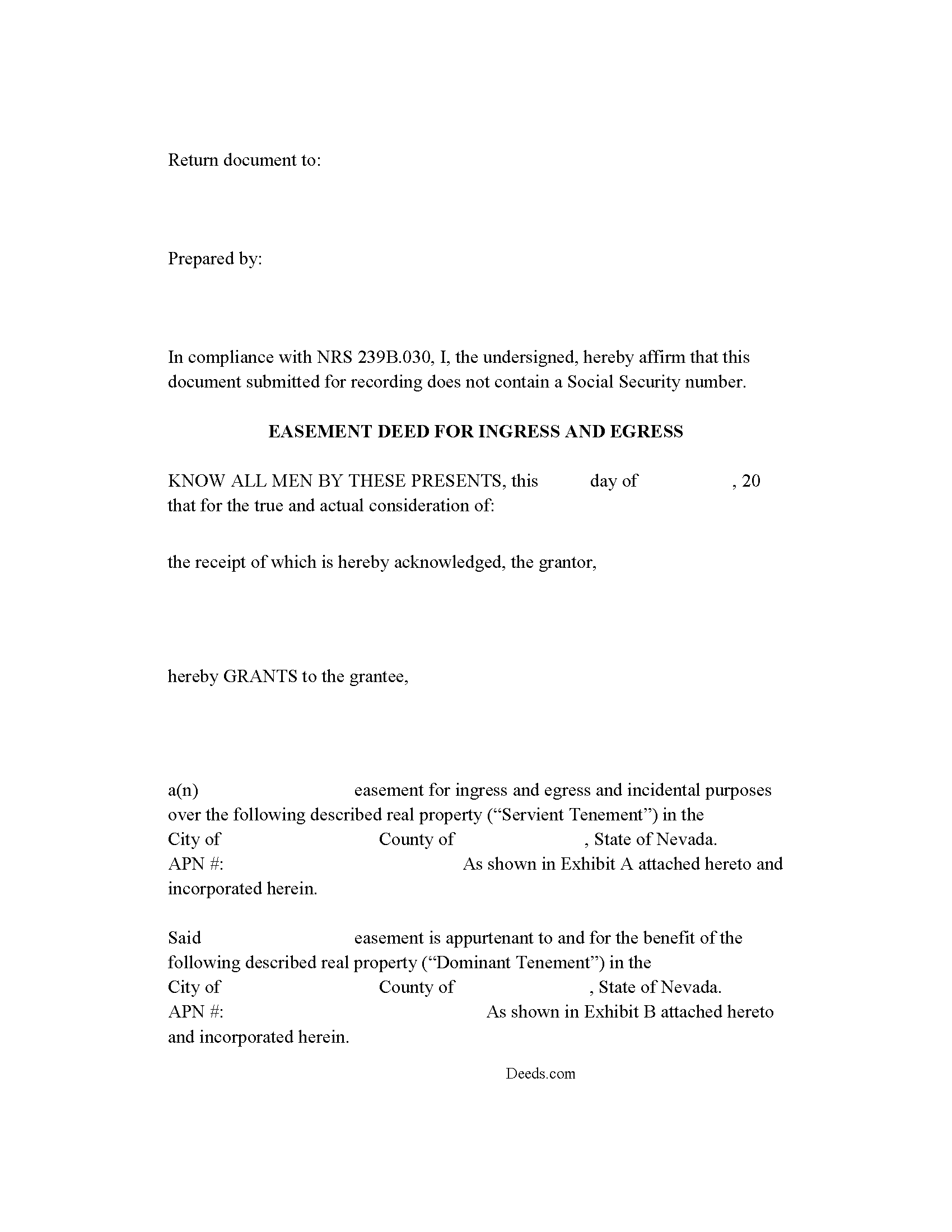
An easement is a non-possessory interest in land that allows one person to use the real property of another person for a specific purpose. Easements can be either appurtenant or in gross, and can be created by deed, contract, or other written instrument. An easement deed should specify the location of the easement, the permitted use or uses, and the persons who may use it.
In this state, a solar easement is an interest in real property which must be expressed in a written instrument that has been signed by the grantor. This is an appurtenant easement. An easement for the collection of solar energy can be created by a grant from the owner of the neighboring land to the owner of land on which equipment for the collection of solar energy has been installed or is planned to be installed. The written instrument must include a description of the burdened and benefited land, as well as the type of equipment that will be used (NRS 111.370). A conservation easement can be created in a similar manner.
An easement deed should be signed by the grantor and acknowledged or proved in order to be recorded. Acknowledgment or proof of an easement deed in Nevada can be taken before a judge or... More Information about the Nevada Easement Deed
Termination of Easement
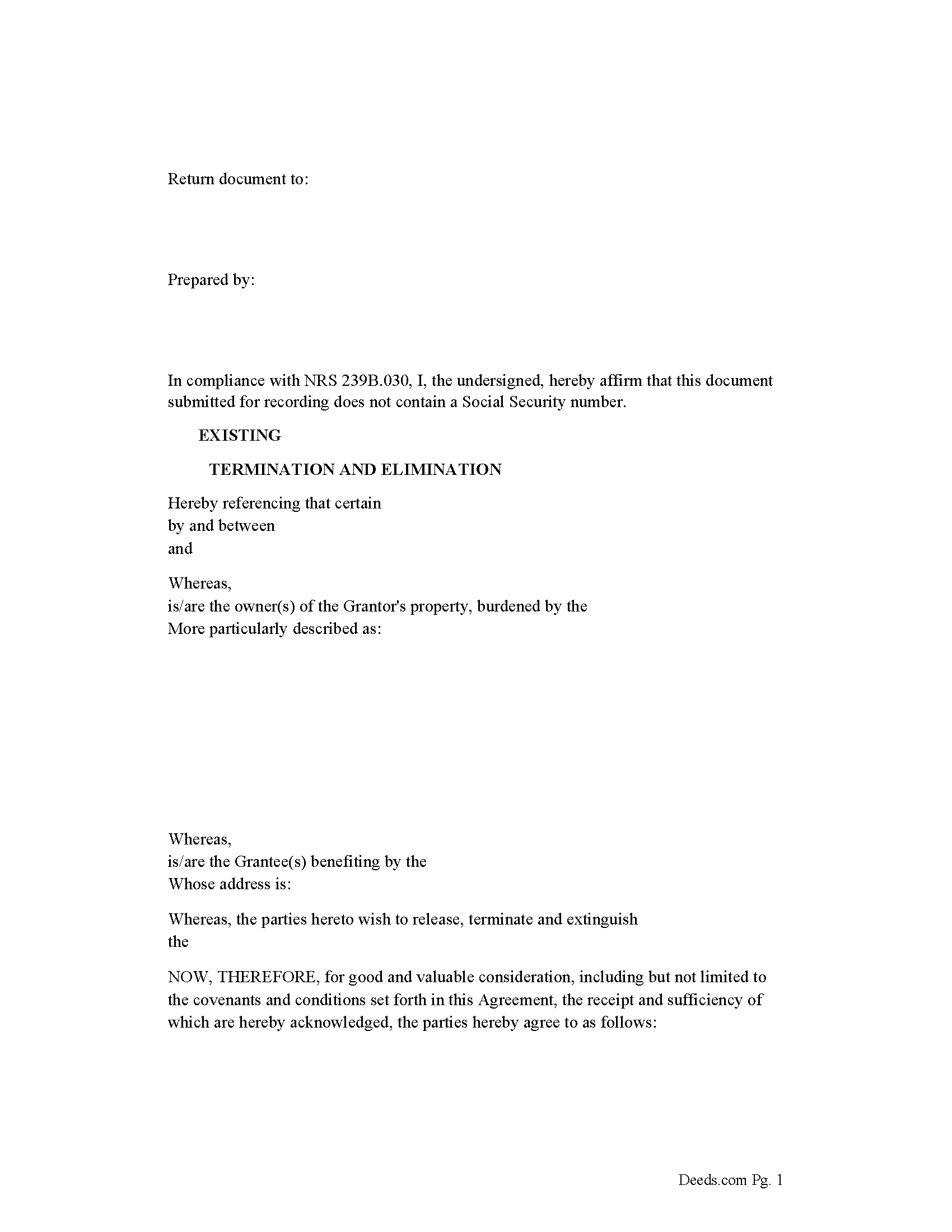
Use this form to release, terminate, extinguish a previously recorded document that involves access to and from a property.
Documents such as:
1. Easement Deeds or Agreements (An easement is a non-possessory interest in land, granting the right to use someone else's property for a specific purpose, like a driveway or utility line)
2. Access Roads
3. Right of Ways
4. Utility Easements (Power, Gas, Water, Sewer, Etc.)
5. Drainage Easements
This document allows the owner of the land, burdened by the access and the party that benefits from the access, to sign an agreement releasing the property from such access, ... More Information about the Nevada Termination of Easement
Correction Deed
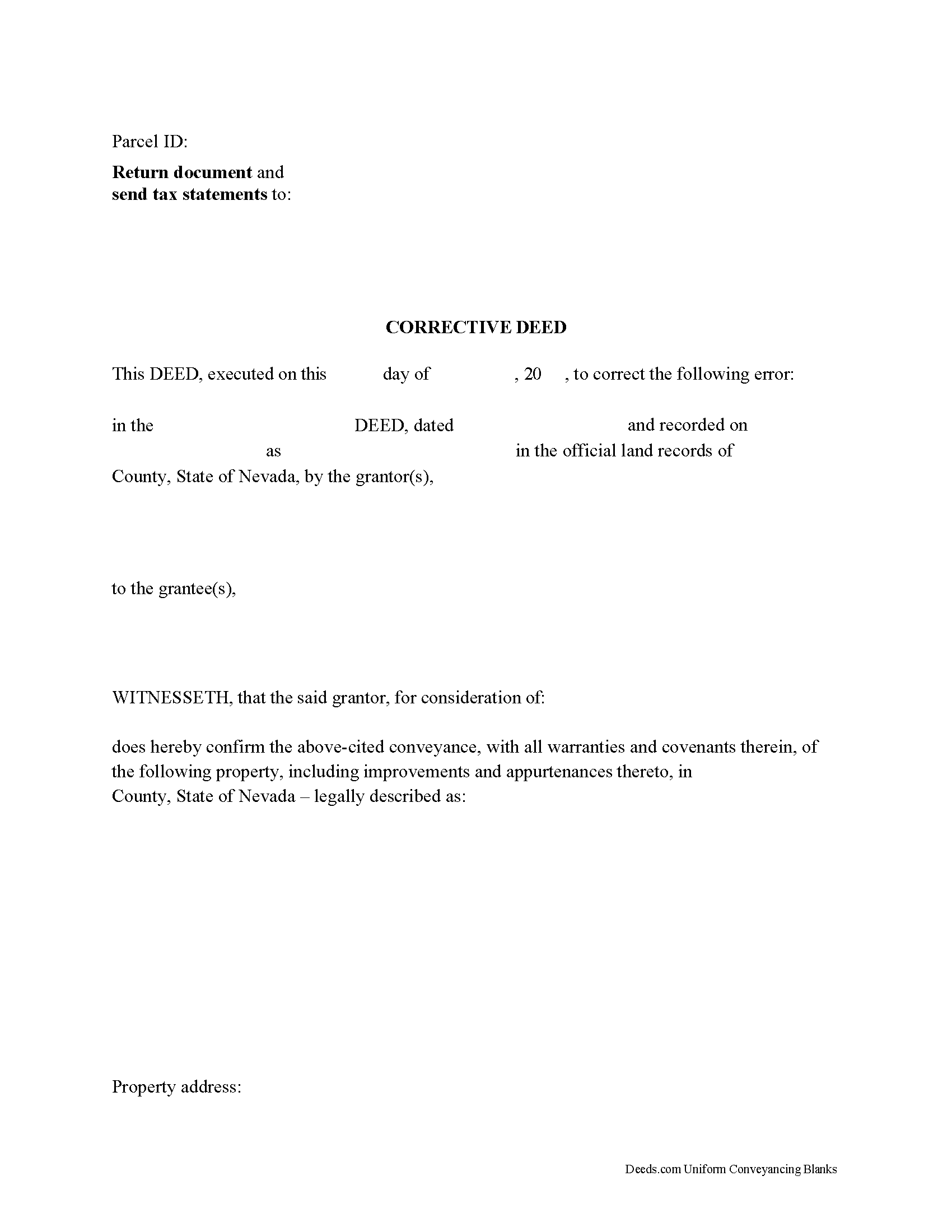
Use the correction deed to amend a previously recorded warranty, special warranty, or quitclaim deed with an error that could affect future title transfer.
A correction deed functions to explain and correct an error in a prior instrument. As such, it passes no title, but only reiterates and confirms the prior conveyance. It should be executed from the original grantor to the original grantee, and it needs to be recorded in order to be legally valid.
The correction deed must reference the original conveyance by type of error, date of execution, date of recording, and recording number and location. Beyond that, it restates the information given in the prior deed, thus serving as its de facto replacement. The prior deed, which constitutes the actual conveyance of title, remains on record as well.
Deeds of correction are most appropriate for minor errors and omissions in the original deed, such as misspelled names, omission of marital status, or typos in the legal description. More substantial changes, such as adding a name to the title or adding/subtracting a portion of land to the legal description of the property, usually require a new deed of conveyance instead of a mere ... More Information about the Nevada Correction Deed
Mineral Deed
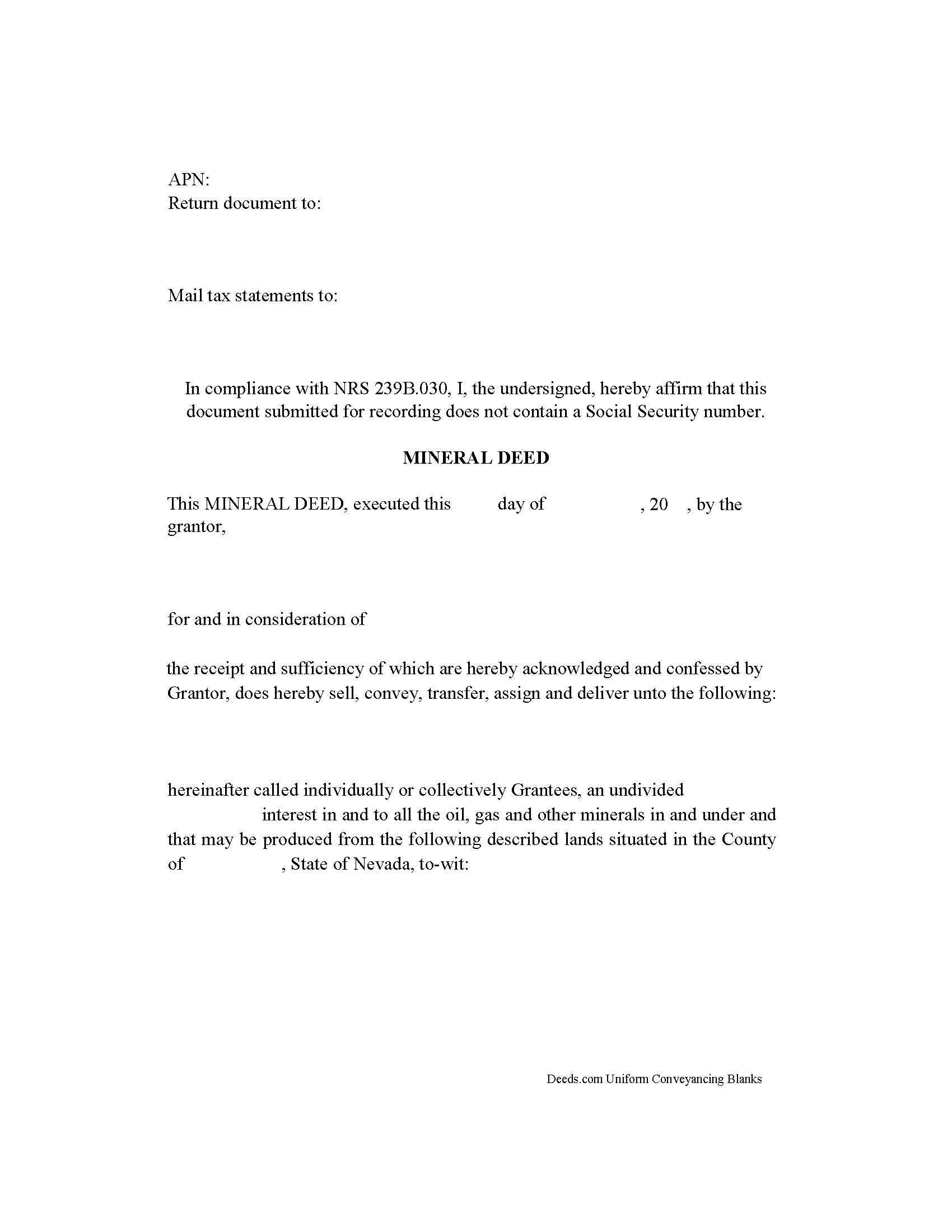
The General Mineral Deed in Nevada transfers oil, gas, and mineral rights from the grantor to the grantee. THIS IS NOT A LEASE. There are no Exceptions or Reservations included.
The transfer includes the oil, gas and other minerals of every kind and nature. It also transfers any and all rights to receive royalties, overriding royalties, net profits interests or other payments out of or with respect to those oil, gas and other minerals. The Grantor can stipulate the percentage of Mineral Rights the Grantee will receive and is made subject to any rights existing under any valid and subsisting oil and gas lease or leases of record.
This general mineral deed gives the grantee the right to access, for the purpose of mining, drilling, exploring, operating and developing said lands for oil, gas, and other minerals, and storing handling, transporting and marketing of such.
In this document the Grantor Warrants and will defend said Title to Grantee. Use of this document has a permanent effect on your rights to the property, if you are not completely sure of what you are executing seek the advice of a legal professional.
(Nevada MD Package includes form, guidelines, and completed... More Information about the Nevada Mineral Deed
Mineral Quitclaim Deed
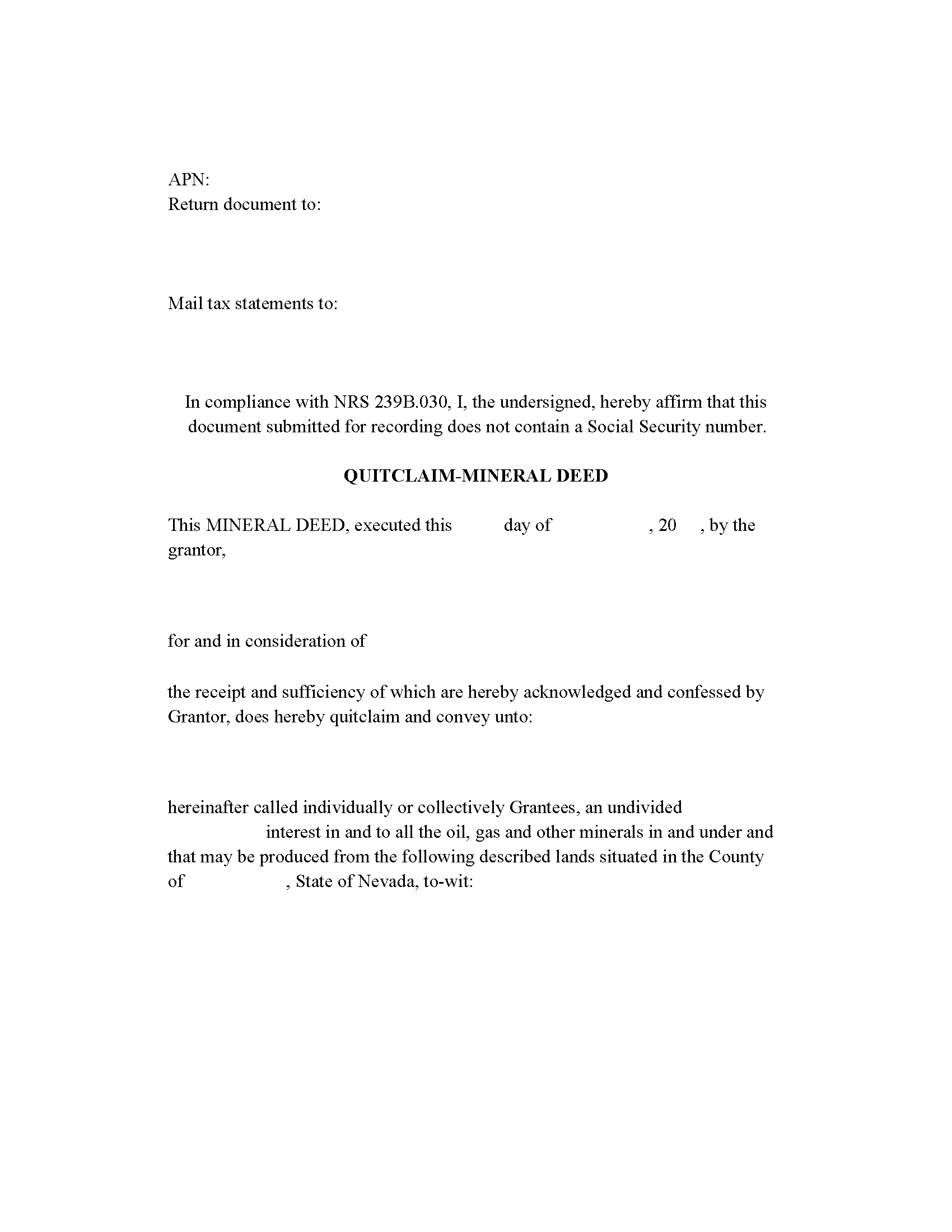
The General Mineral Deed in Nevada Quitclaims oil, gas, and mineral rights from the grantor to the grantee. THIS IS NOT A LEASE. There are no Exceptions or Reservations included.
The transfer includes the oil, gas and other minerals of every kind and nature. The Grantor can stipulate the percentage of Mineral Rights the Grantee will receive.
This general mineral deed gives the grantee the right to access, for the purpose of mining, drilling, exploring, operating and developing said lands for oil, gas, and other minerals, and storing handling, transporting and marketing of such.
The seller, or grantor Quitclaims the mineral rights and does NOT accept responsibility to any discrepancy of title (This assignment is without warranty of title, either express or implied)
Uses: Mineral deeds with quitclaim are often used in situations where the grantor wants to quickly release any interest they might have in mineral rights, such as in settling estates, resolving disputes, clearing up uncertainties about ownership in a title's history or when mineral rights have previously been severed or fragmented from surface rights and cloud a title, making it difficult to transfer property.... More Information about the Nevada Mineral Quitclaim Deed
Transfer on Death Deed
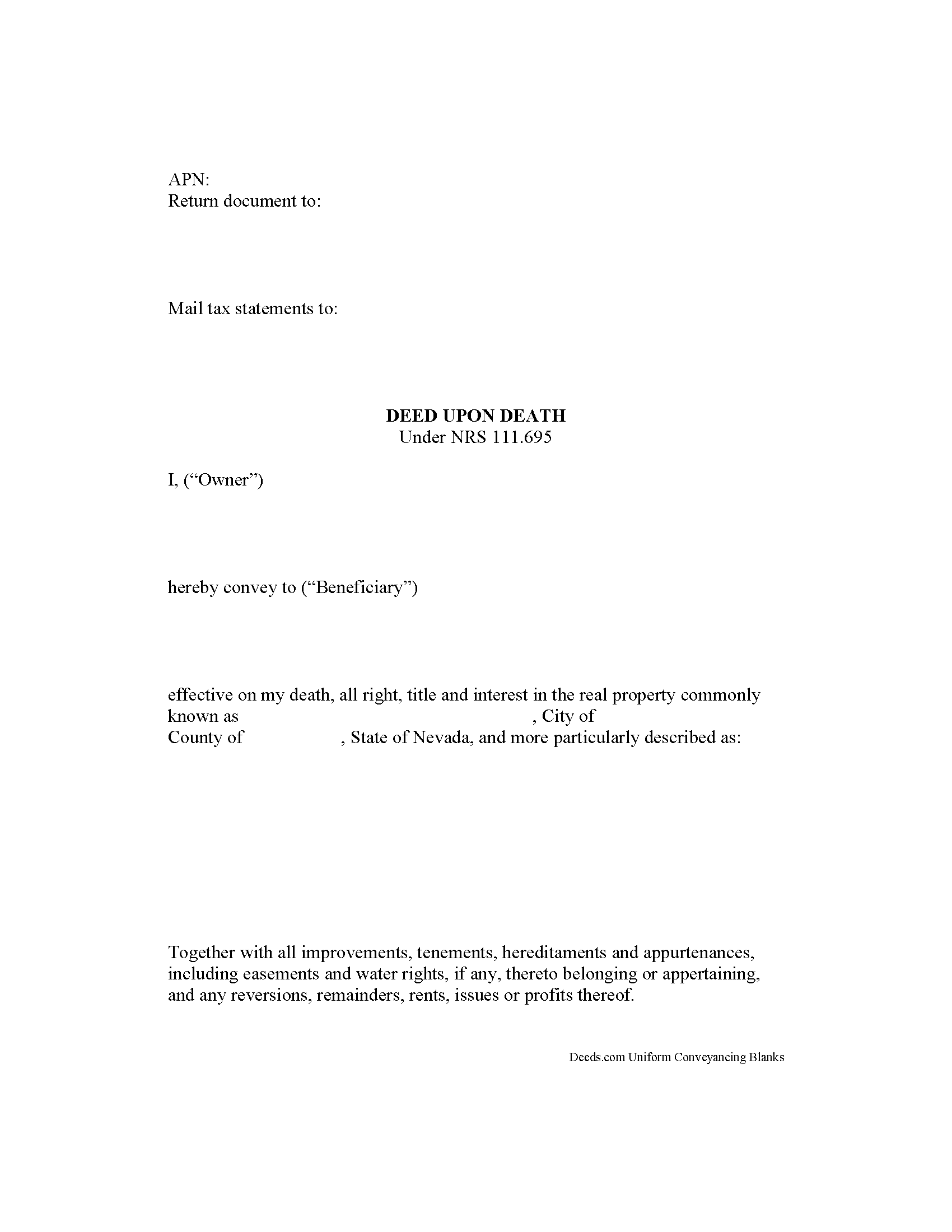
Nevada's statutory transfer on death instrument for real property is called a deed upon death. It is governed by NRS 111.655-111.699 (2013), inclusive, and incorporates the Uniform Real Property Transfer on Death Act into its text. Like other transfer on death deeds, THE EXECUTED DEED, AS WELL AS ANY CHANGES OR REVOCATIONS, MUST BE RECORDED IN THE COUNTY WHERE THE LAND IS LOCATED, DURING THE OWNER'S NATURAL LIFE.
Transfer on death deeds/deeds upon death make it possible for owners of real estate in Nevada to convey their land to one or more designated beneficiaries after their death, with no need to subject the property to probate distribution. Significantly, transfers included in deeds upon death are not affected by directions included in wills. As such, these deeds comprise only one part of a regularly updated overall estate plan.
When correctly executed and recorded, a deed upon death only contains a potential future interest in the property, so there is no requirement to pay consideration or to give notice to any named beneficiary. In addition, the owner retains absolute control over the property, including the right to change beneficiary designations, revoke the deed,... More Information about the Nevada Transfer on Death Deed
Transfer on Death Revocation
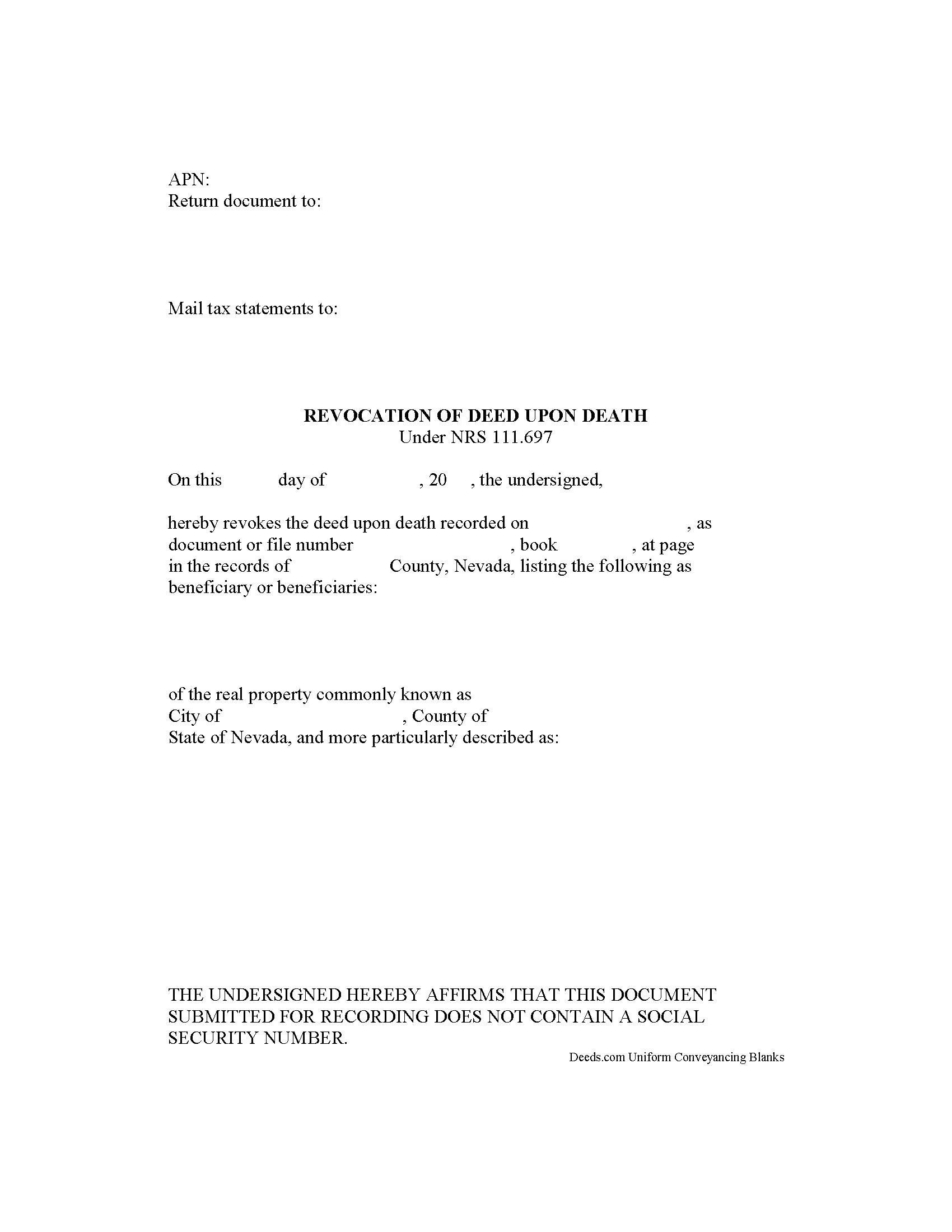
Revoking a Nevada Deed upon Death
Nevada's statutory transfer on death instrument for real property is called a deed upon death. It is governed by NRS 111.655-111.699 (2013), inclusive, and incorporates the Uniform Real Property Transfer on Death Act into its text. THE EXECUTED REVOCATION MUST BE RECORDED IN THE COUNTY WHERE THE LAND IS LOCATED, DURING THE OWNER'S NATURAL LIFE.
Deeds upon death offer many unique features, but one of the more unusual is their revocability. While these deeds are not affected by directions contained in a will, the statutes provide two primary ways to revoke the potential future interest.
The first option deals with re-deeding the property to someone else. Because the deed only conveys the owner's current interest at the time of death, if there is no interest, there is nothing to convey. The owner might also record several transfer on death deeds for the same property. In that case, "the deed upon death that is last recorded before the death of the owner is the effective deed." See 111.677.
The second option involves executing and recording a statutory revocation document, formally cancelling the recorded deed upon death. Owners may rec... More Information about the Nevada Transfer on Death Revocation
Transfer on Death Affidavit
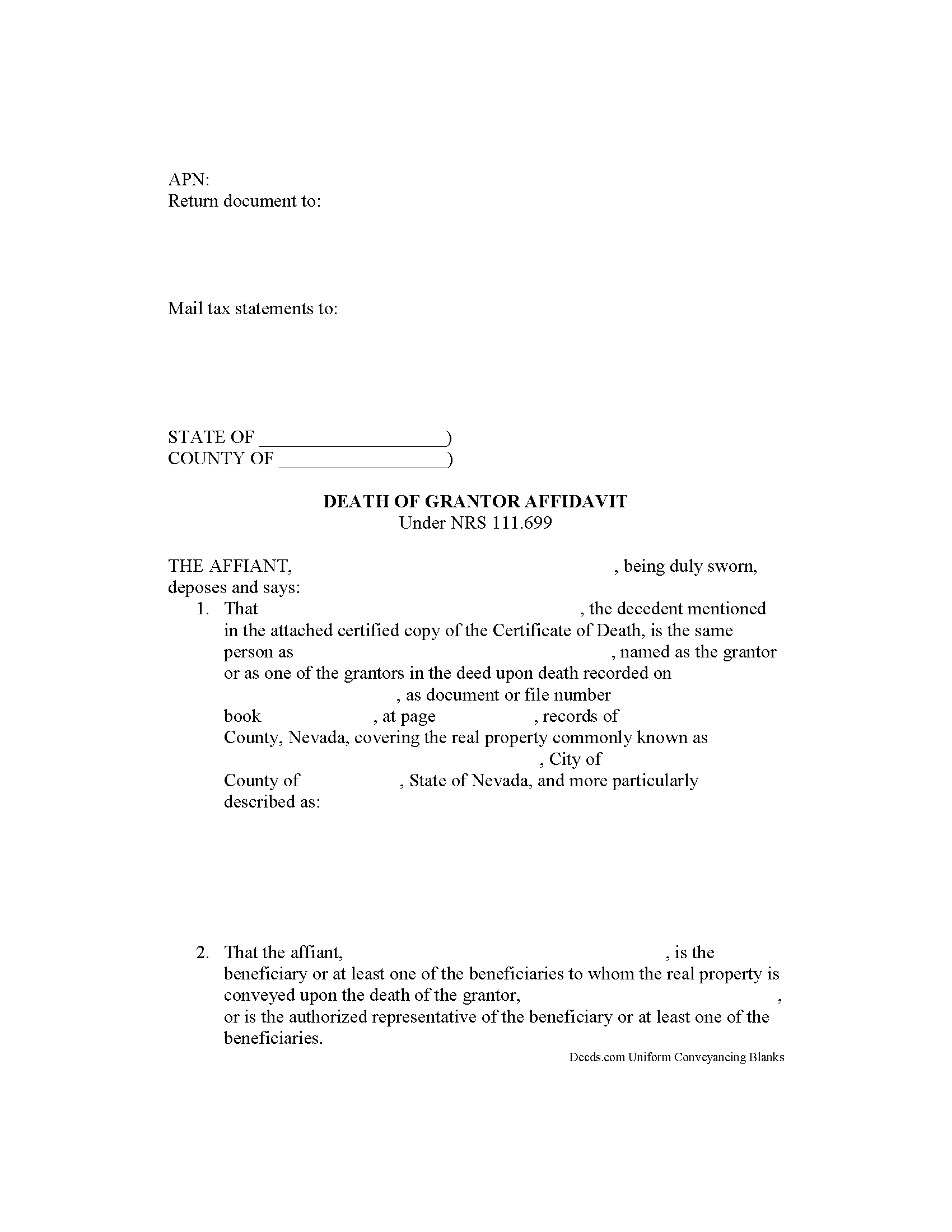
Gaining Title to Nevada Real Estate with a Death of Grantor Affidavit
Nevada's statutory transfer on death instrument for real property is called a deed upon death. It is governed by NRS 111.655-111.699 (2013), inclusive, and incorporates the Uniform Real Property Transfer on Death Act into its text.
NRS 111.699 provides the requirements and procedure for transferring ownership of real property related to a deed upon death. This process is important because allows the recorder to maintain accurate ownership records and update taxpayer information. When the last grantor of a deed upon death dies, the surviving beneficiary should:
1. Execute a death of grantor affidavit;
2. Attach a certified copy of the death certificate for each grantor/owner; and
3. Complete a declaration of value of property pursuant to NRS 375.060;
4. Record the documents in the office of the county recorder where the deed was recorded.
Note, though, that under NRS 111.691, property transferred by a deed upon death is subject to any liens on the property in existence on the date of the death of the grantor. For example, if there is a mortgage on the property, the new owner becomes res... More Information about the Nevada Transfer on Death Affidavit
Special Power of Attorney for Real Property
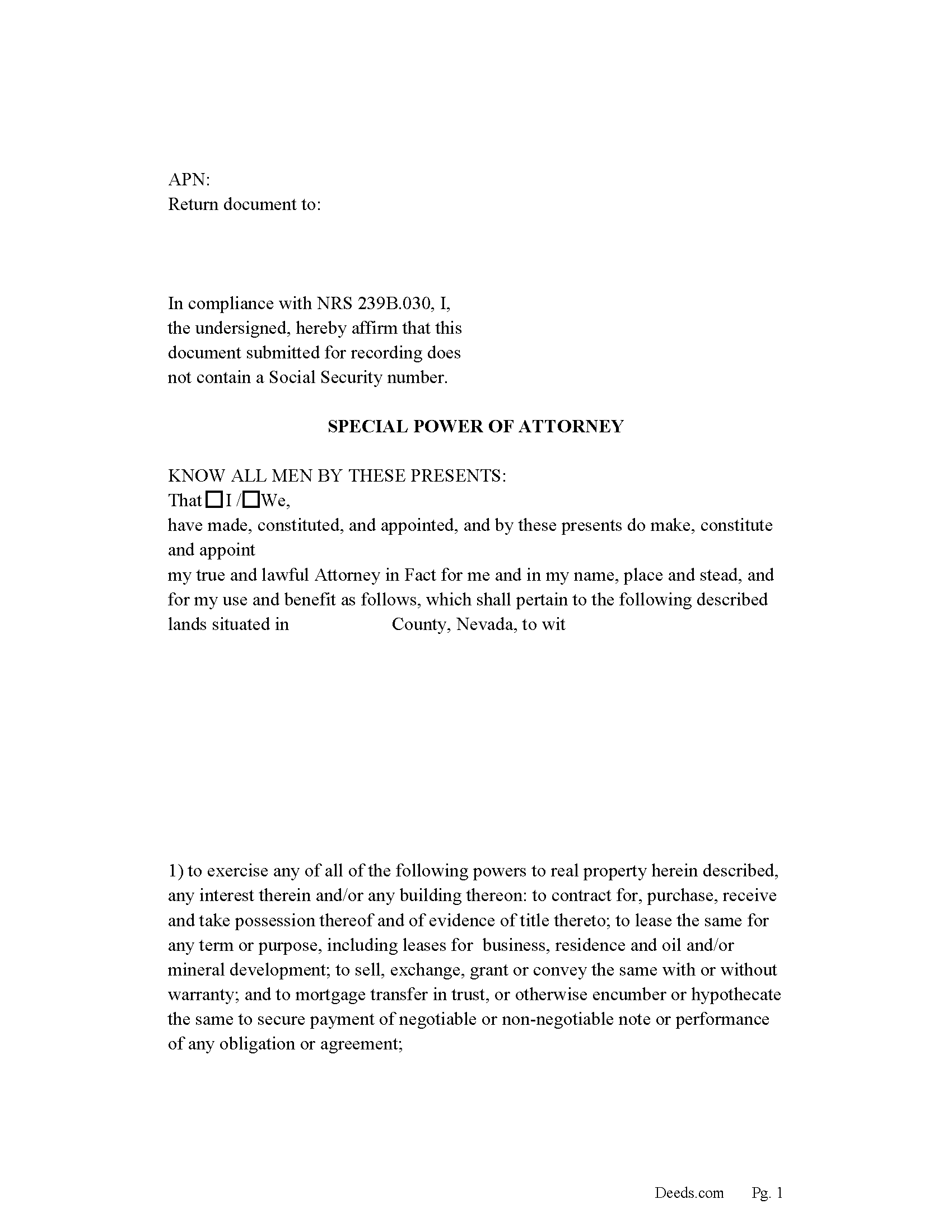
This Special Power of Attorney is used for Real Property. In this form the principal appoints an Agent and empowers him/her to perform a real estate transaction. This allows your agent; to buy, sell, exchange, transfer and in any legal manner deal in and with the same; and to mortgage, transfer in trust or otherwise encumber. Powers can be further limited or defined in the "Special Instructions" section. (Example: The sole purpose is for the SALE of the described property.)
This power of attorney is durable, meaning; (not terminated by the principal's incapacity) (NRS162A.040)
Formatted for recording. (Every power of attorney, or other instrument in writing, containing the power to convey any real property as agent or attorney for the owner thereof, or to execute, as agent or attorney for another, any conveyance whereby any real property is conveyed, or may be affected, must be recorded as other conveyances whereby real property is conveyed or affected are required to be recorded.) (NRS162A.480 (2))
(Nevada SPOA Package includes form, guidelines, and completed example)... More Information about the Nevada Special Power of Attorney for Real Property
Affidavit of Death of Joint Tenant
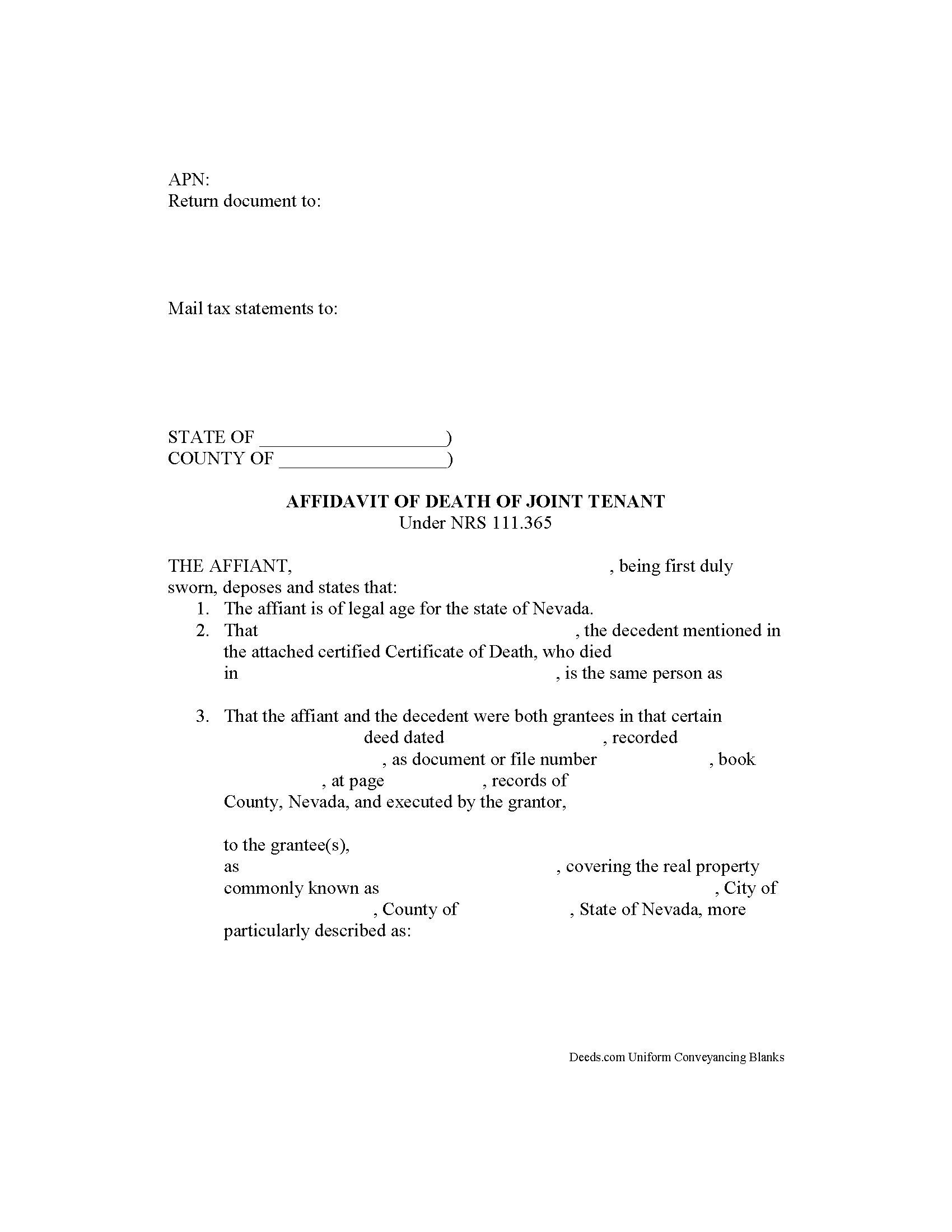
The requirements for an affidavit of death in Nevada are contained in NRS111.365.
For Nevada real estate owned by two or more persons as joint tenants or as community property with right of survivorship, the death of one co-owner means that his or her property rights are shared equally amongst the survivors, without the need for probate distribution. This transfer technically happens "as a function of law" when one owner dies.
Even so, surviving co-owners must initiate the process by recording an affidavit of death, accompanied by a certified copy of the death certificate, to terminate all title to or interest in real property of each deceased joint tenant or the deceased spouse. After the affidavit is recorded in the office of the recorder of the county or counties in which the real property is located, the deceased owner's rights are presumed to be terminated, and vested solely in the surviving joint tenant or spouse or vested jointly in the surviving joint tenants.
The days and weeks following the death of a family member, friend, or business associate are often difficult, but timely recording of the affidavit of death is important. It preserves a clear chain of tit... More Information about the Nevada Affidavit of Death of Joint Tenant
Affidavit of Death of Spouse Holding Community Property
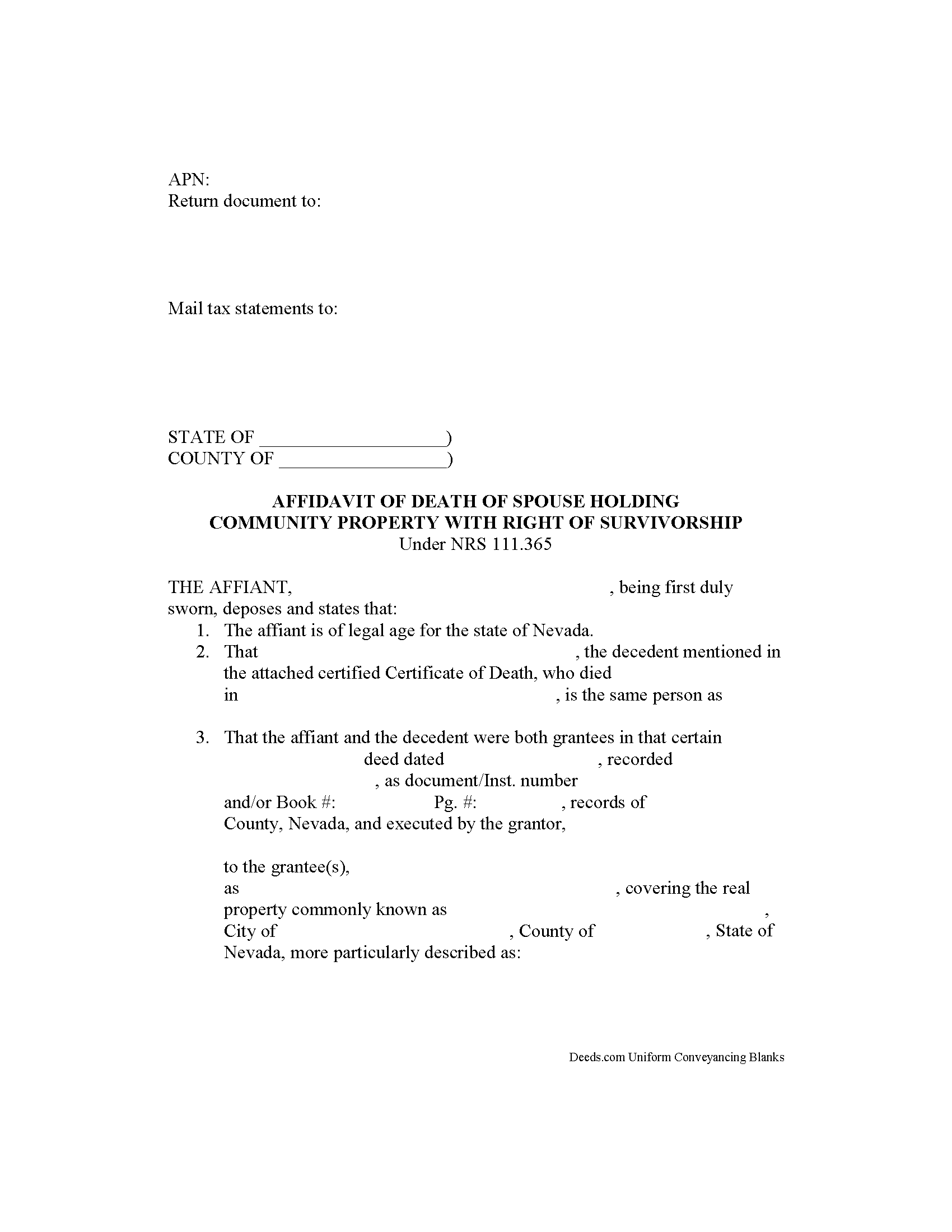
Nevada Affidavit of Death of Spouse Holding Community Property with Right of Survivorship
The requirements for an affidavit of death in Nevada are contained in NRS111.365.
For Nevada real estate owned by spouses as community property with right of survivorship, the death of one spouse means that his or her property rights are conveyed to the remaining spouse, without the need for probate distribution. This transfer technically happens "as a function of law" when one owner dies.
Even so, surviving spouses must initiate the process by recording an affidavit of death, accompanied by a certified copy of the death certificate, to terminate all title to or interest in real property of the deceased spouse. After the affidavit is recorded in the office of the recorder of the county or counties in which the real property is located, the deceased owner's rights are presumed to be terminated, and vested solely in the surviving spouse.
The days and weeks following the death of a family member are often difficult, but timely recording of the affidavit of death is important. It preserves a clear chain of title, which makes future conveyances of the property less complicated. In ... More Information about the Nevada Affidavit of Death of Spouse Holding Community Property
Personal Representative Deed of Distribution
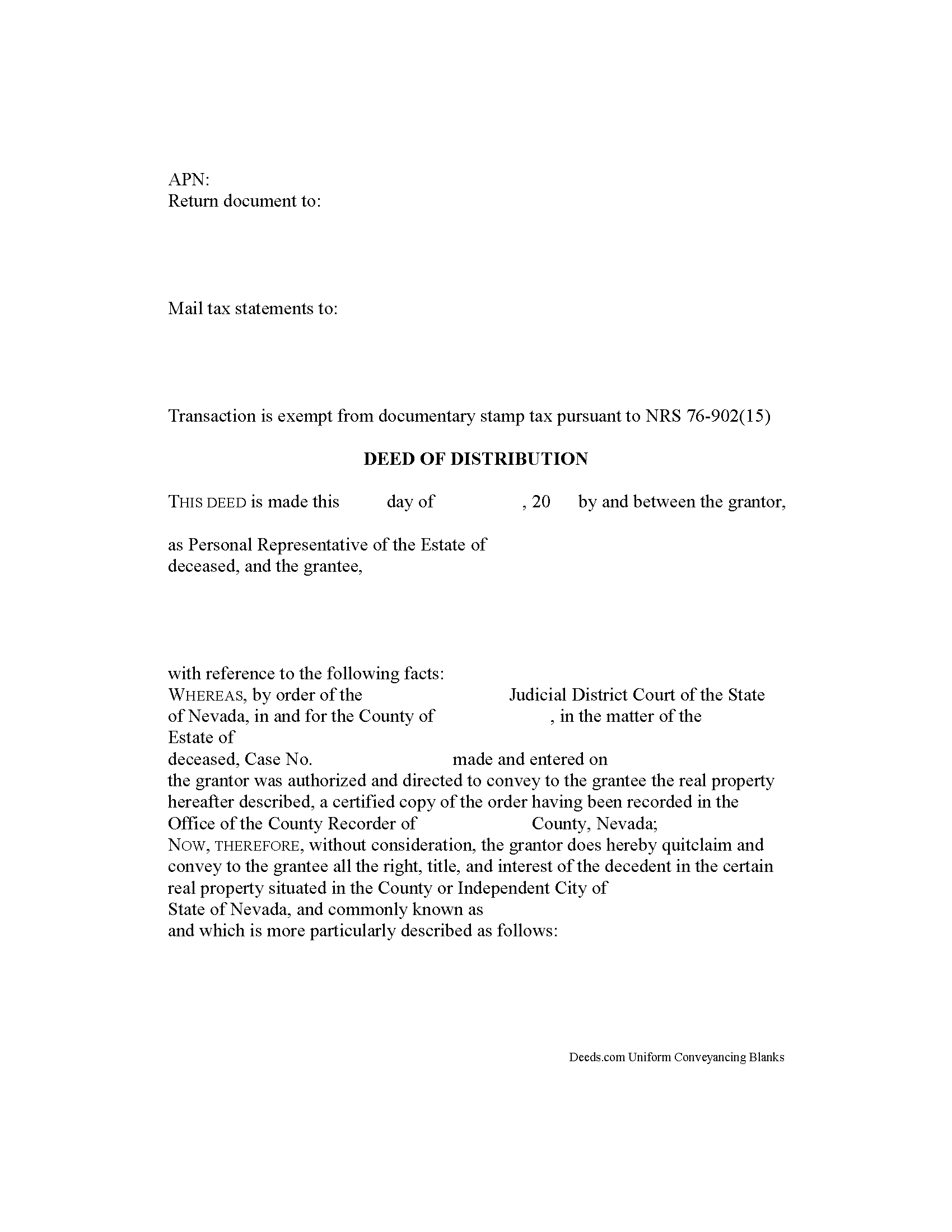
Deed of Distribution for Personal Representatives in Nevada
Following petition, record a deed of distribution pursuant to a court order to convey, transfer, or deliver property as proof of a distributee's succession to the decedent's interest in real estate.
The personal representative (PR) is an individual with a fiduciary obligation to distribute the decedent's assets in accordance with the will, if one exists, and following the relevant laws. Letters issued by the court authorize the PR to administer a decedent's estate using probate.
Deeds executed by personal representatives must meet all state and local standards for form and content. In addition, they name the PR as grantor and reference the decedent whose estate is being probated. The deed also identifies the judicial district and county processing the probate of the estate, and recites the case number and details about the court order confirming the sale. A copy of the order for distribution must be recorded alongside deed of distribution in the office of the county recorder in the county where the subject parcel of property is located (see NRS 151.110)
The deed of distribution includes a covenant to the gran... More Information about the Nevada Personal Representative Deed of Distribution
Personal Representative Deed of Sale
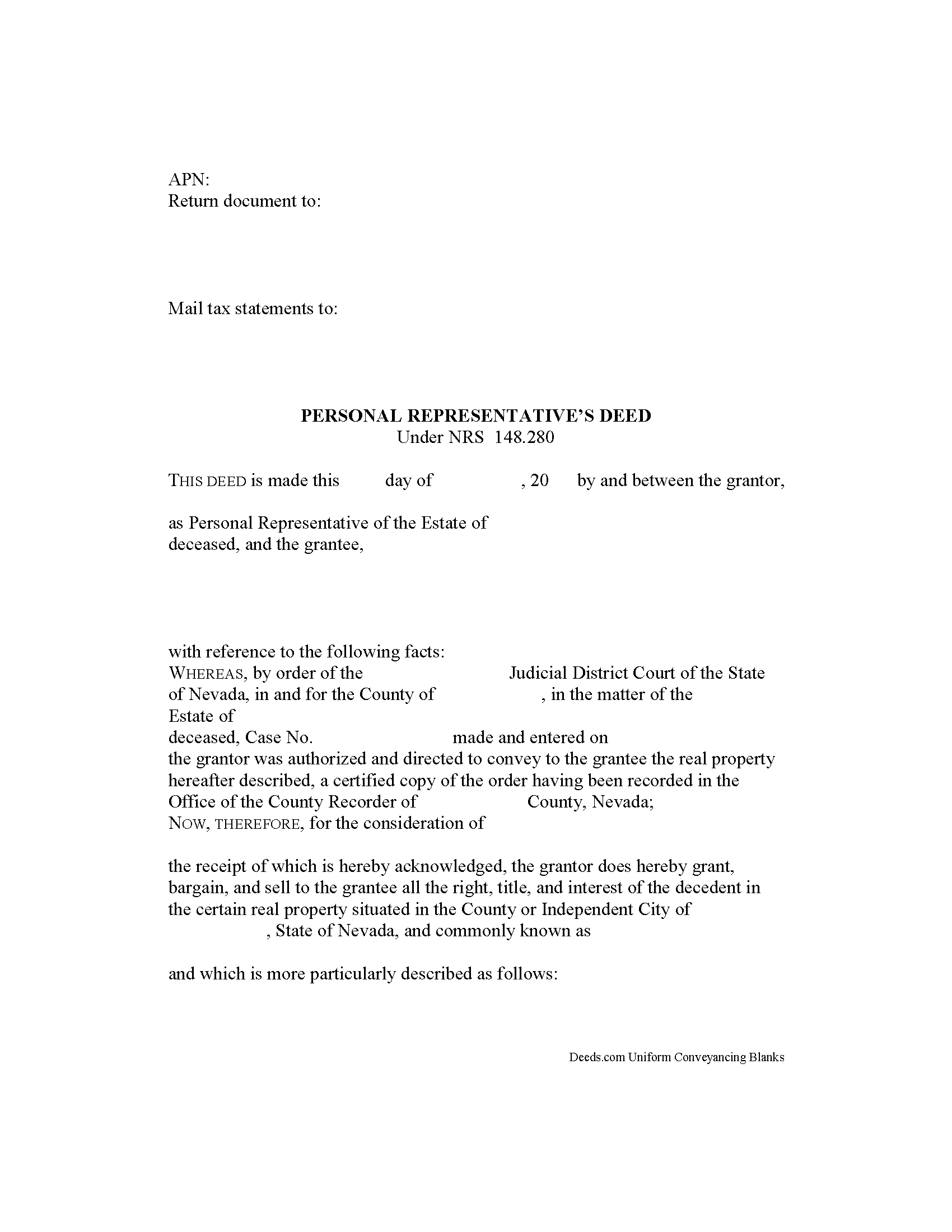
Following petition and court confirmation of a sale of real property by a personal representative, use a personal representative's deed of sale under NRS 148.280 to convey real property from a decedent's estate to a purchaser. The sale must be confirmed by the court within 30 days, and the order confirming the sale recorded in the recorder's office of the country where the subject property is located.
The personal representative (PR) is an individual with a fiduciary obligation to distribute the decedent's assets in accordance with the will, if one exists, and following the relevant laws. Letters issued by the court authorize the PR to administer a decedent's estate using probate.
Deeds executed by personal representatives must meet all state and local standards for form and content. In addition, they name the PR as grantor and reference the decedent whose estate is being probated. The deed also identifies the judicial district and county processing the probate of the estate, and recites the case number and details about the court order confirming the sale. Record the completed PR deed in the recorder's office of the county wherein the subject property is located.
Notice ... More Information about the Nevada Personal Representative Deed of Sale
Disclaimer of Interest
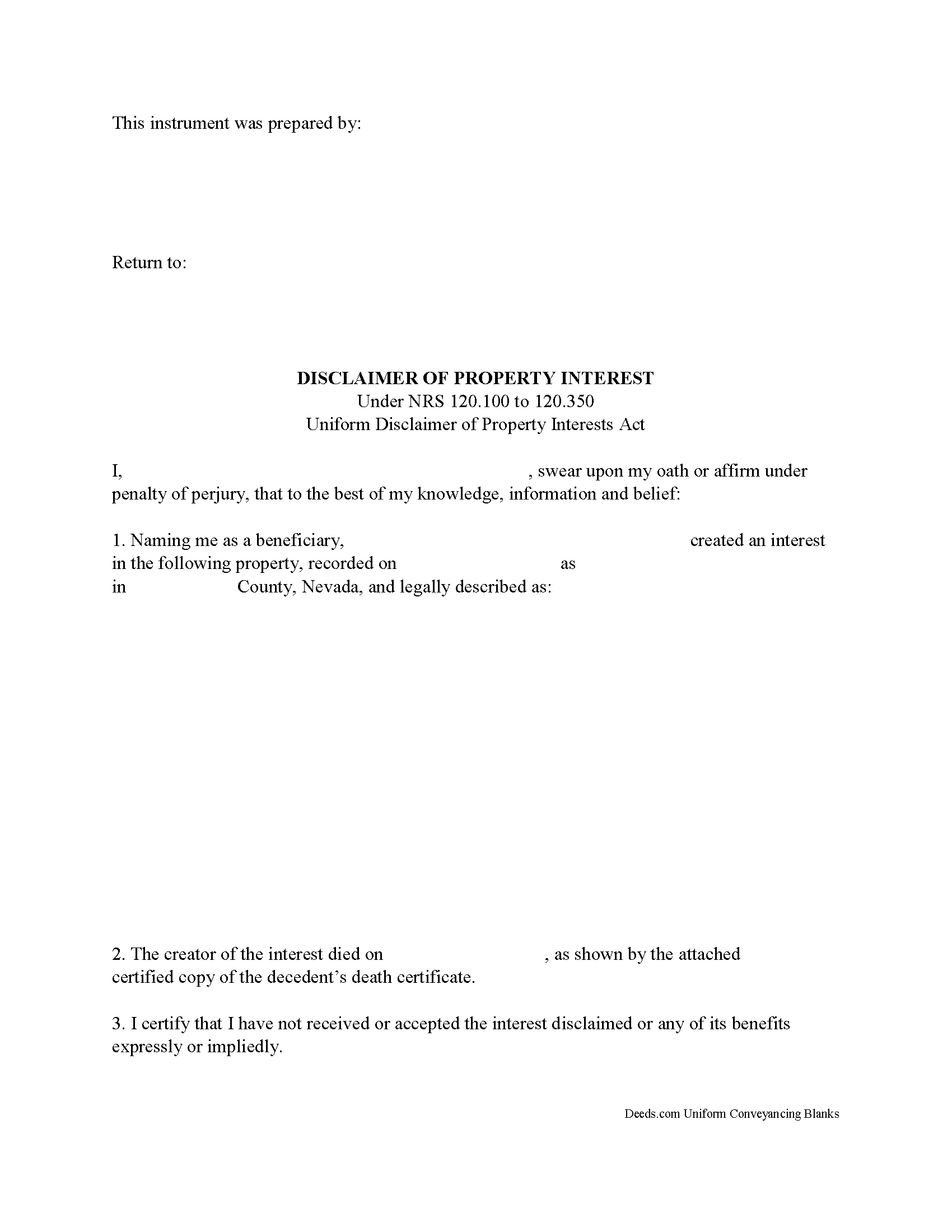
As part of the Nevada Revised Statutes, the beneficiary of an interest in property may renounce the gift, either in part or in full (NRS 120.100 to 120.350 Uniform Disclaimer of Property Interests Act). Note that the option to disclaim is only available to beneficiaries who have not acted in any way to indicate acceptance or ownership of the interest (120.300).
The disclaimer must be in writing and include a description of the interest, a declaration of intent to disclaim all or a defined portion of the interest, and be signed by the disclaimant (120.220 (3)).
Deliver the disclaimer within nine months of the transfer (e.g., the death of the creator of the interest) to the personal representative of the decedent's estate, the trustee or file it with the court having authority to appoint such a person (120.290). If real property is involved, record a copy of the disclaimer in the county in which the property or interest disclaimed is located in order to avoid any ambiguity regarding the chain of title (120.320). In the case of a designation that has become irrevocable, a disclaimer of real property must be recorded (120.290 (6) (b)).
A disclaimer is irrevocable and bindin... More Information about the Nevada Disclaimer of Interest
Certificate of Trust
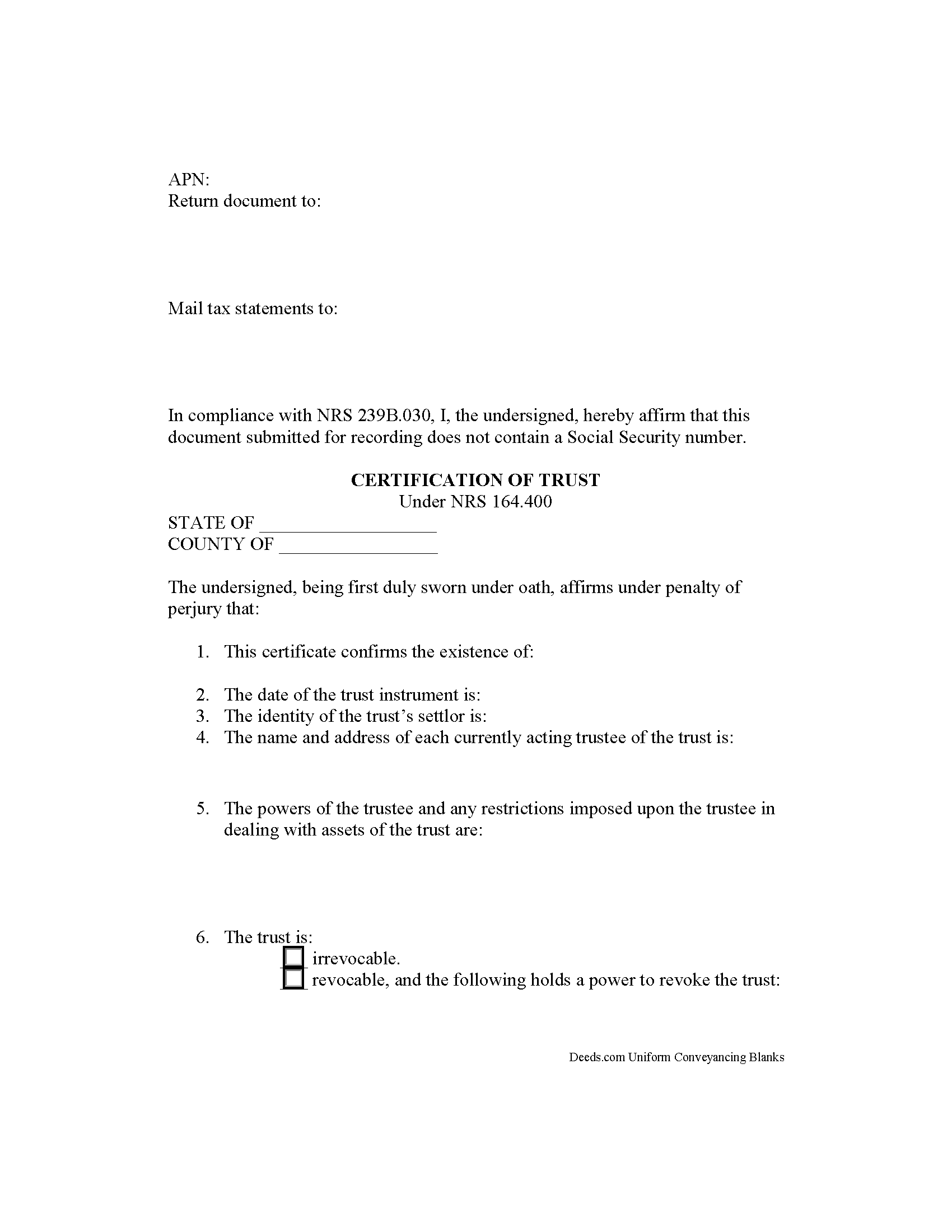
A Nevada certification of trust is a document presented by a trustee, either voluntarily or upon request, to any party conducting business with a trustee. In Nevada, the certificate is codified at NRS 164.410.
Instead of providing the entire trust instrument, the trustee presents the certificate, which contains information regarding the trust that is relevant to the transaction at hand. The document certifies that the trust exists and that the trustee has authority to act on behalf of the trust.
In Nevada, the certificate is an affidavit signed and acknowledged by all currently acting trustees of a trust (164.400). It attests to the trust's existence by citing the name of the trust and date of execution of the trust instrument, a document establishing the terms of the trust which generally is not recorded. The certificate includes the names of the trust's settlor, or person funding the trust with assets, and each acting trustee. It also states whether the trust is irrevocable or revocable, and by whom, if applicable.
A certificate requires a description of the powers of the trustee in dealing with trust assets, and any restrictions upon those powers. When used in transac... More Information about the Nevada Certificate of Trust
Deed of Trust
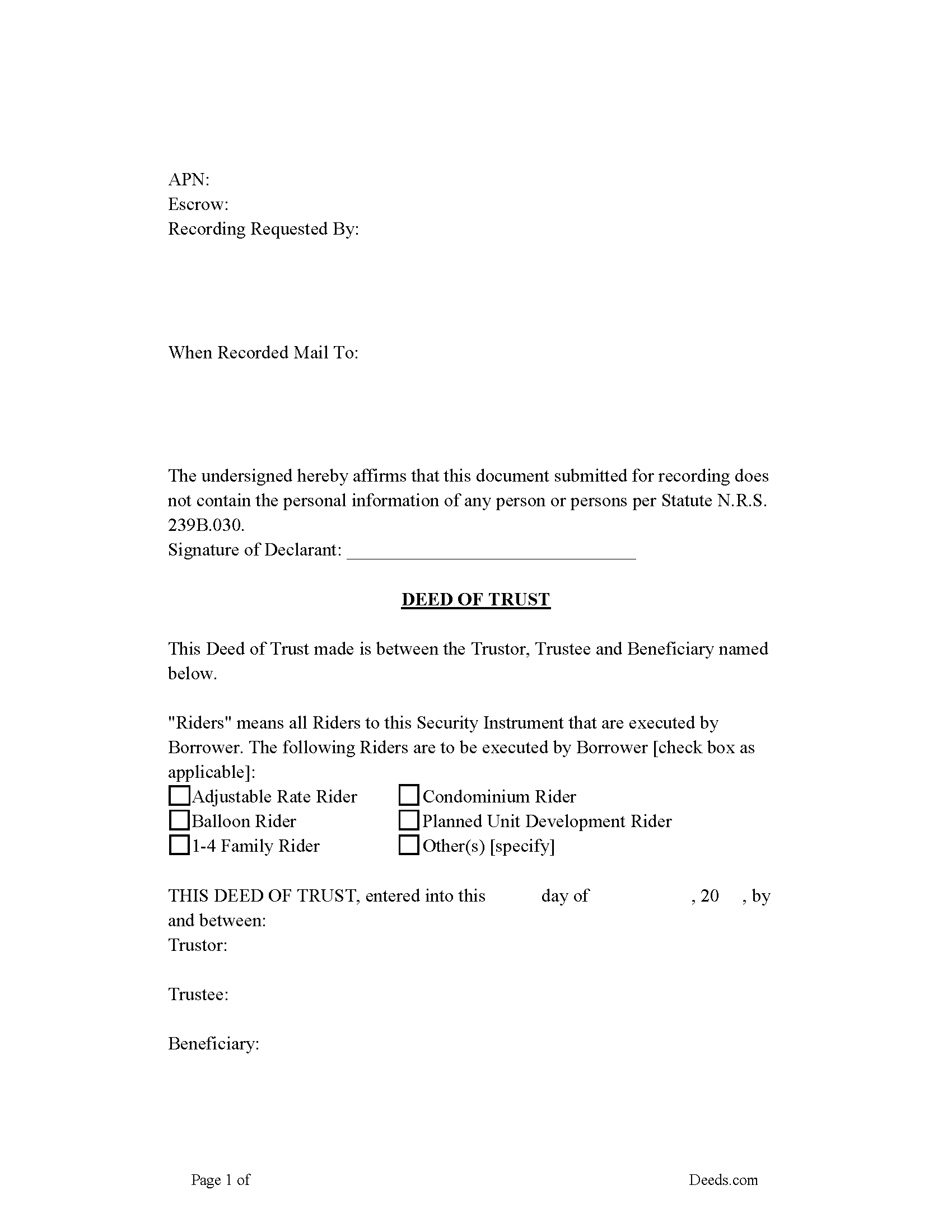
In Nevada, a Deed of Trust is the most commonly used instrument to secure a loan. Foreclosure can be done non-judicially, saving time and expense. This process is called a Trustee Sale.
There are three parties in this Deed of Trust:
1- The Trustor (Borrower)
2- Beneficiary (Lender) and a
3- Trustee (Neutral Third Party)
Basic Concept. The Trustor (Borrower) conveys property title to a Trustee (Neutral Party). A Trustee or beneficiary/Lender can take an action against any person for damages.
In this Deed of Trust the Trustor/Borrower appoints the Lender as an Attorney in Fact, allowing the lender to prepare, sign, file and record this Deed of Trust, financing statements; any documents of title or registration, or like papers, and to take any other action deemed necessary, useful or desirable by Lender to perfect and preserve Lenders security interest against the rights of interest of third persons. This appointment coupled with stringent default terms makes this Deed of Trust more suitable for parties or investors financing/selling their own homes, rental property and condominiums.
Trustor (Borrower) shall take reasonable care of the Subject Real Property and the bui... More Information about the Nevada Deed of Trust
Assignment of Deed of Trust
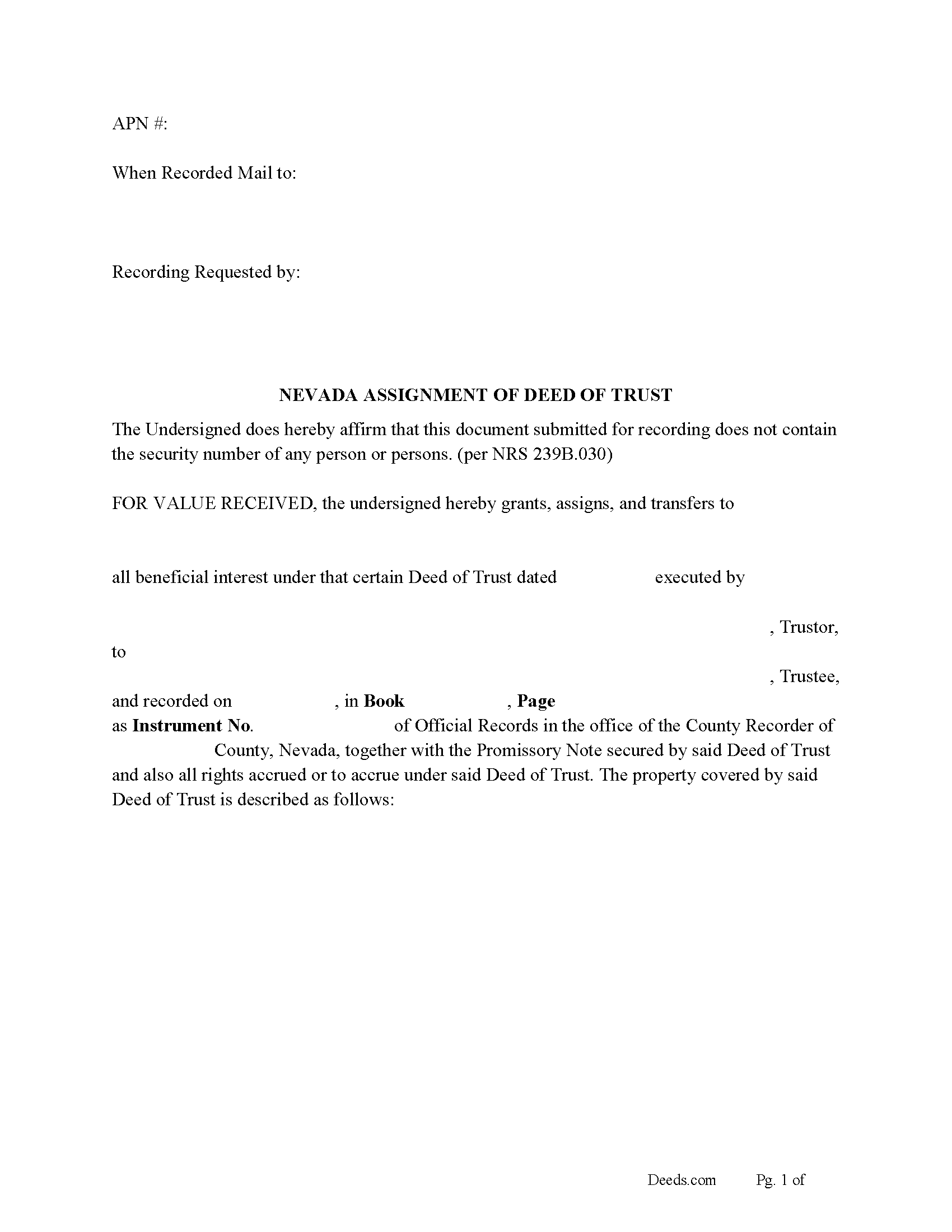
In this form the beneficiary/lender transfers interest in a Deed of Trust and Promissory Note to another party. (Any assignment of the beneficial interest under a deed of trust must be recorded in the office of the recorder of the county in which the property is located, and from the time any of the same are so filed for record shall operate as constructive notice of the contents thereof to all persons) (If the beneficial interest under a deed of trust has been assigned, the trustee under the deed of trust may not exercise the power of sale pursuant to NRS 107.080 unless and until the assignment is recorded pursuant to this subsection.) (NRS106.210). The borrower of a Deed of Trust may request to the servicer for a [certified copy of the note, the deed of trust and all assignments of the note and deed of trust if:]
[(a)The real property subject to the deed of trust is a single-family dwelling;
(b) The grantor is the owner of record of the real property;
(c) The grantor currently occupies the real property as his or her principal residence; and
(d) The servicer or beneficiary of the deed of trust is a banking or financial institution (as defined in NRS 106.295) or any ot... More Information about the Nevada Assignment of Deed of Trust
Deed of Full Reconveyance
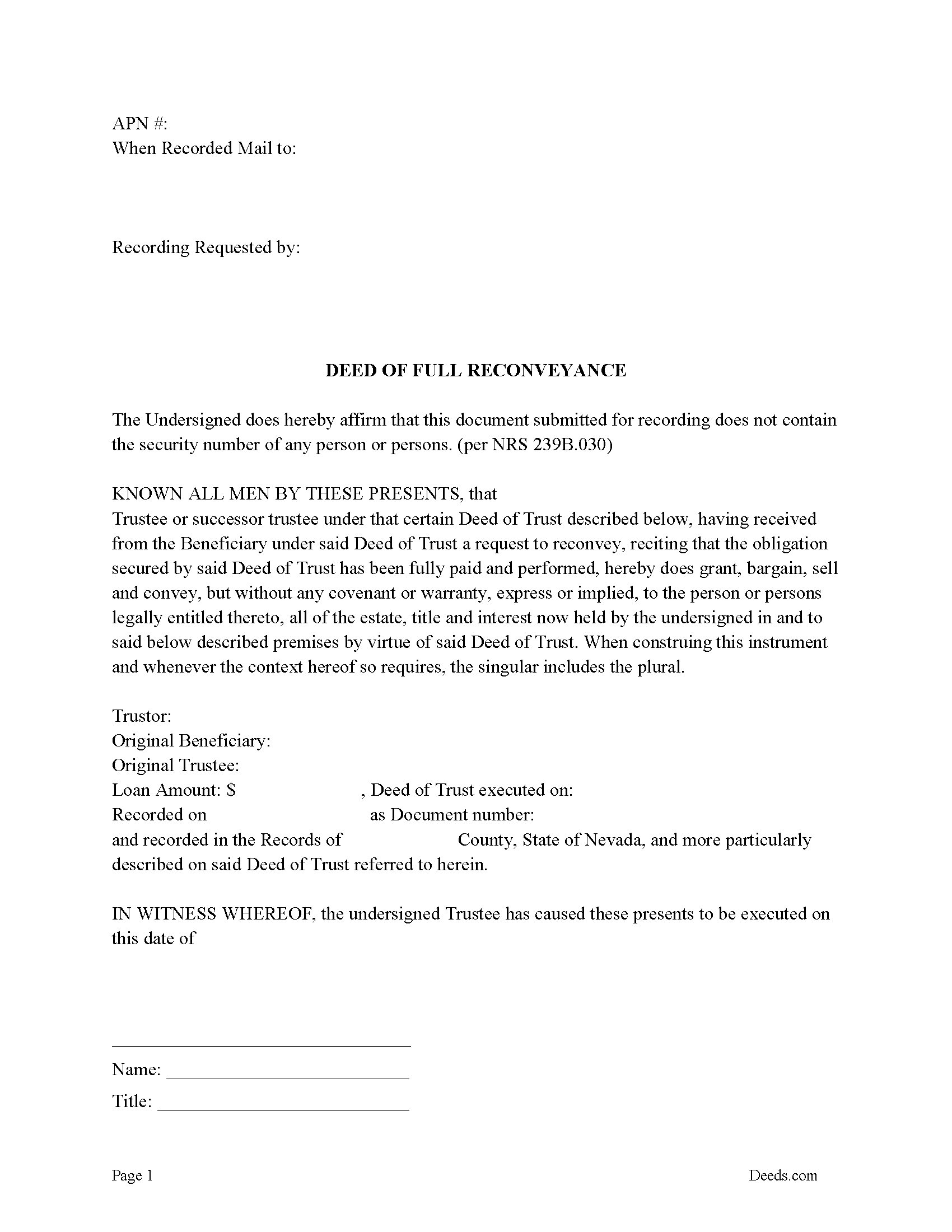
In general, when a debt secured by a Deed of Trust has been paid the beneficiary/Lender shall deliver to the Trustee/Third Party or Trustor/Borrower the original note and Deed of Trust. (If the beneficiary delivers the original note and deed of trust to the trustee or the trustee has those documents in his or her possession, the trustee shall deliver those documents to the grantor.) NRS 107.077(1)
(Within 45 calendar days after a debt secured by a deed of trust made on or after October 1, 1991, is paid or otherwise satisfied or discharged, and a properly executed request to reconvey is received by the trustee, the trustee shall cause to be recorded a reconveyance of the deed of trust.) NRS 107.077(2)
This Form States-Trustee or successor trustee under that certain Deed of Trust described below, having received from the Beneficiary under said Deed of Trust a request to reconvey, reciting that the obligation secured by said Deed of Trust has been fully paid and performed.
And pursuant to NRS 107.077(4)
(a) The name of the beneficiary;
(b) The name of the trustor;
(c) The recording reference to the deed of trust;
(d) A statement that the debt secured by the deed of trust ... More Information about the Nevada Deed of Full Reconveyance
Substitution of Trustee and Deed of Reconveyance (For Deed of Trust)
.png)
When a promissory note secured by a Deed of Trust is paid off, the beneficiary/lender contacts the trustee and notifies him/her to reconvey title to the Trustor/borrower. If the original Trustee is unavailable or can't act, a substitute trustee is typically chosen. This form allows the lender to choose a new trustee and authorizes the new trustee to reconvey title by recording the form. This form can be exercised by the original beneficiary/lender or a secondary beneficiary/lender who may have purchased/inherited the promissory note.
Use this document when the subject "Deed of Trust" has been recorded formatted Pursuant to Nev. Rev. Stat. Sect. 107.073 (If the deed of trust has been recorded by a microfilm or other photographic process, a marginal release may not be used and an acknowledged reconveyance of the deed of trust must be recorded.) (NRS 107.073(2))
Typically, within 21 day after satisfaction of debt, the lender delivers to the (trustee or trustor/) borrower (the original note and deed of trust), (if the beneficiary)/lender (is in possession of those documents). The lender will also (execute a request to reconvey the estate in real property conveyed to the trustee b... More Information about the Nevada Substitution of Trustee and Deed of Reconveyance (For Deed of Trust)
Notice of Right to Lien
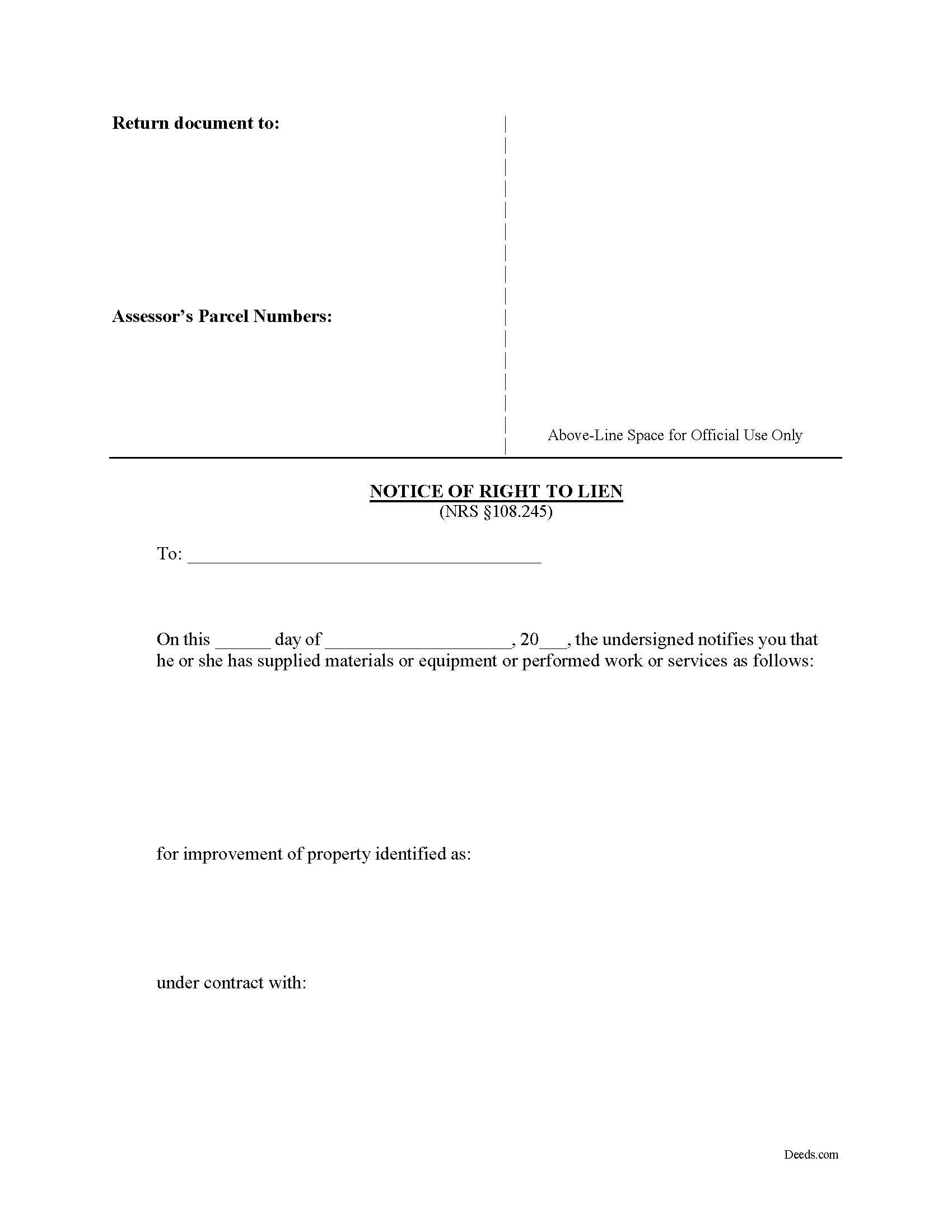
The notice of right to lien form is used to put a property owner on notice that the person providing labor or materials for a construction project might have a lien claim against the property. In accordance with NRS 108.245, the notice of right to lien must be filed by every lien claimant, besides a prime contractor or other person who contracts directly with an owner or sells materials directly to an owner or one who performs only labor.
The notice shall be filed at any time after the first delivery of material or performance of work or services under a contract. The notice must also be served by delivering it in person or through certified mail to the owner of the property.
The notice is not a lien and does not provide actual or constructive notice of a lien for any purpose. The notice is merely a required step to notify a property owner of a potential future lien on his or her property.
Unless the notice form is filed and notice has been given, Nevada law will not permit a lien for materials or equipment furnished or for work or services performed, except for labor only. The notice does not need to be verified, sworn to or acknowledged by a notary public.
A lien cl... More Information about the Nevada Notice of Right to Lien
Notice of Mechanics Lien
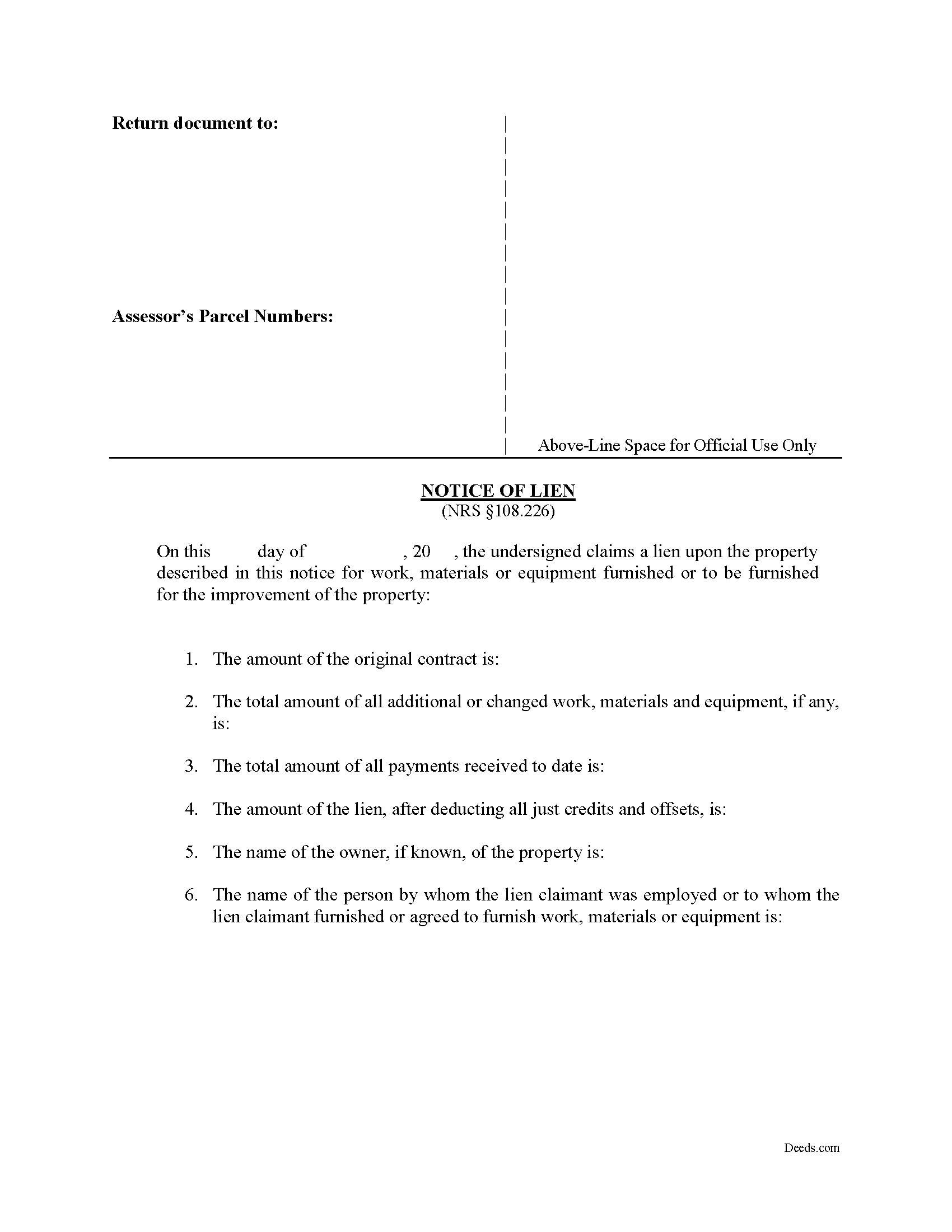
A mechanic's lien is a security interest in the title to property for the benefit of those who have supplied labor or materials that improve the property. In terms of real property, a mechanic's lien is also known as a construction lien. It is also called a materialman's lien or supplier's lien when referring to those supplying materials, a laborer's lien when referring to those supplying labor, and a design professional's lien when referring to architects or designers who contribute to a work of improvement.
Under Nevada law, in order to ensure payment for services and to protect the rights of a contractor, subcontractor, or material supplier, a mechanic's lien can be filed against a homeowner's property. The lien creates a legal method for these contractors, subcontractors and suppliers to foreclose on the improved property, in turn forcing a sale of the property in order to obtain payment for their work or materials.
In Nevada, mechanic's liens are governed under Chapter 108 of Nevada Revised Statutes. Any person who provides labor, materials, or equipment valued at $500 or more which is used in the construction, alteration, or repair of property is entitled to a mechani... More Information about the Nevada Notice of Mechanics Lien
Notice of Completion
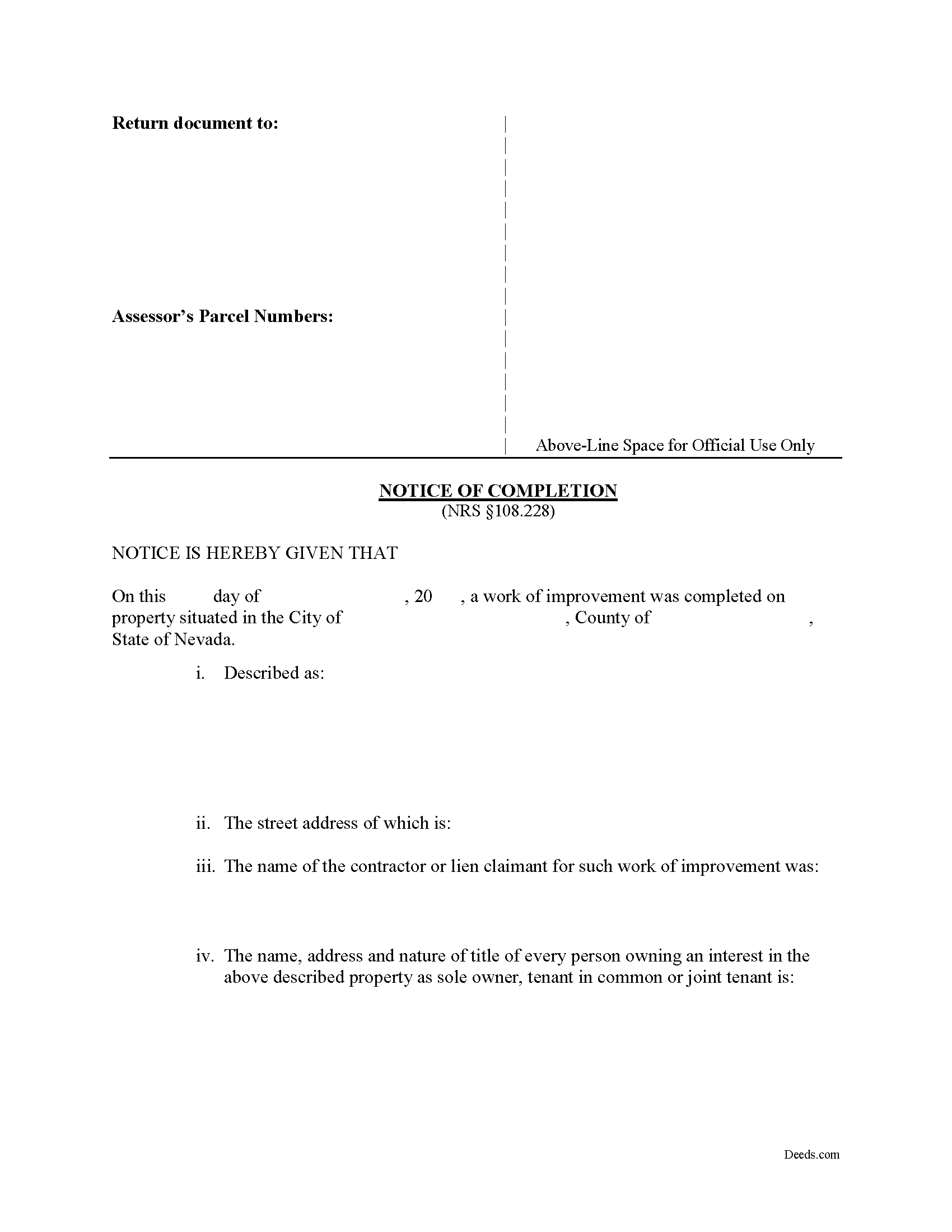
What is a Notice of Completion?
In terms of mechanic's lien law, a notice of completion is filed by property owners and served on all contractors and potential lien claimants to put them on notice that the time for filing any lien is now ripe (and begins the 40-day clock for them to file). It is used to protect property owners who may be subject to a lien by "smoking out" the lien claimants and telling them if they have a lien, now is the time to file. In short, filing a notice will reduce the amount of time a lien claimant may file from 90 days to 40 days after the last work or improvement on the property.
The notice of completion essentially is used to put contractors and other lien claimants on notice that the work or improvement has been completed and therefore triggers the time for filing a lien. The form is designed for property owners to use in order to ascertain all potential lien claims on the land or buildings. After work on your property is completed or otherwise stopped for 30 days, use and record this form to begin the time in which any possible lien claimant may file his or her lien.
According to NRS 108.22116, a work or improvement is completed when one of t... More Information about the Nevada Notice of Completion
Discharge of Lien
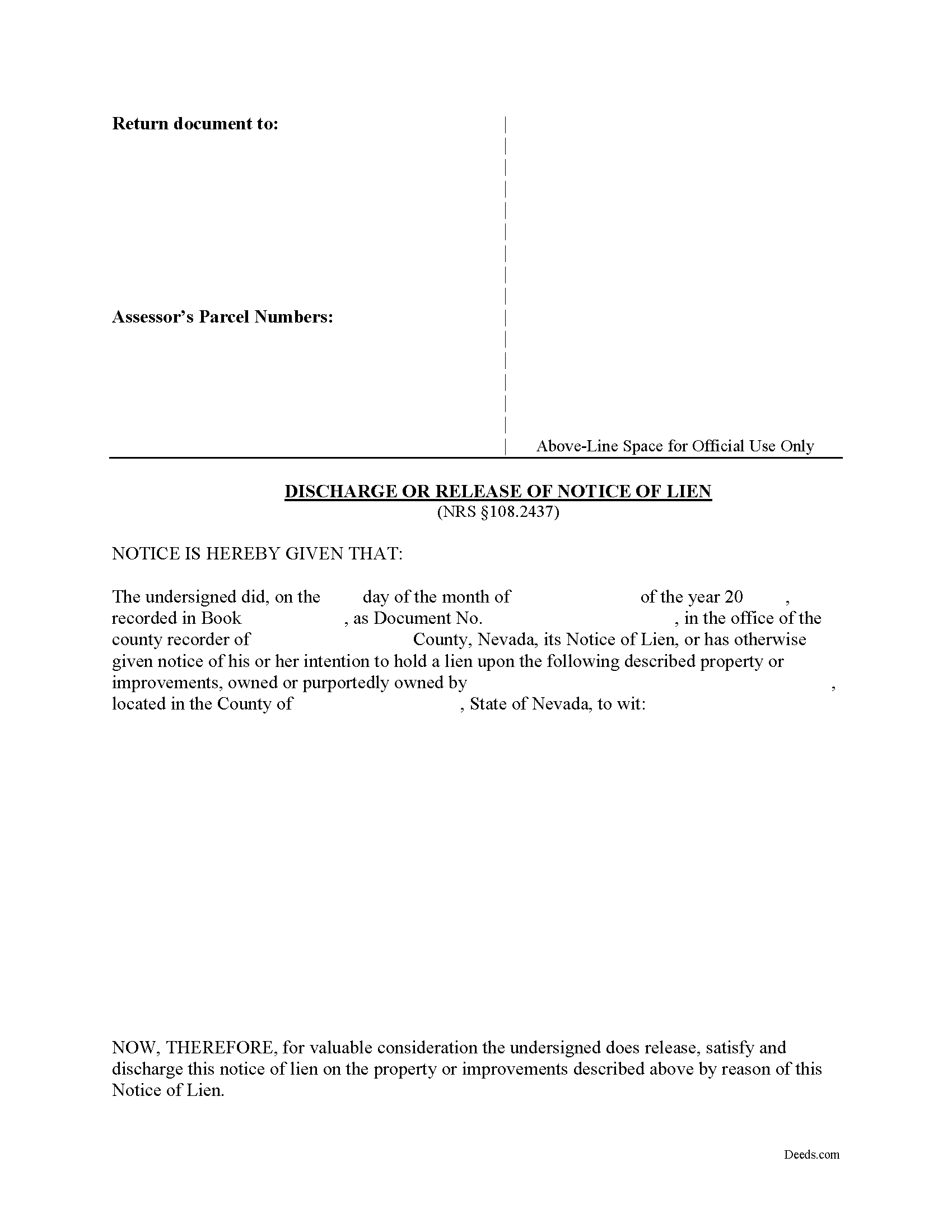
Discharging a Lien in Nevada
So at this point you've filed your mechanic's lien against a client's property after the client never paid the invoice for a completed project. Now the client has finally paid off the lien or maybe you've come to some agreement with the client to accept a lesser amount. You're free to forget about the ordeal and move on to prepare for your next job, right?
Not quite; Nevada lien law requires you to perform one additional step of filing a notice of discharge to provide public notice that you are no longer claiming a lien against the title. It is essential to properly file and record this notice because you can face potential consequences by skipping this step. By this time, you've already complied with statutory lien law to the letter in order to obtain your lien, so don't be sloppy now.
The discharge of lien form gives notice to the owner, other lien claimants, and anyone else with a potential interest in the subject property that the lien has been paid in full or has otherwise terminated. If you obtained a mechanic's lien and the debtor or other person responsible for the lien pays the debt or you discharge the lien for any other reason, you ... More Information about the Nevada Discharge of Lien
Release of Notice of Lien by Surety Bond
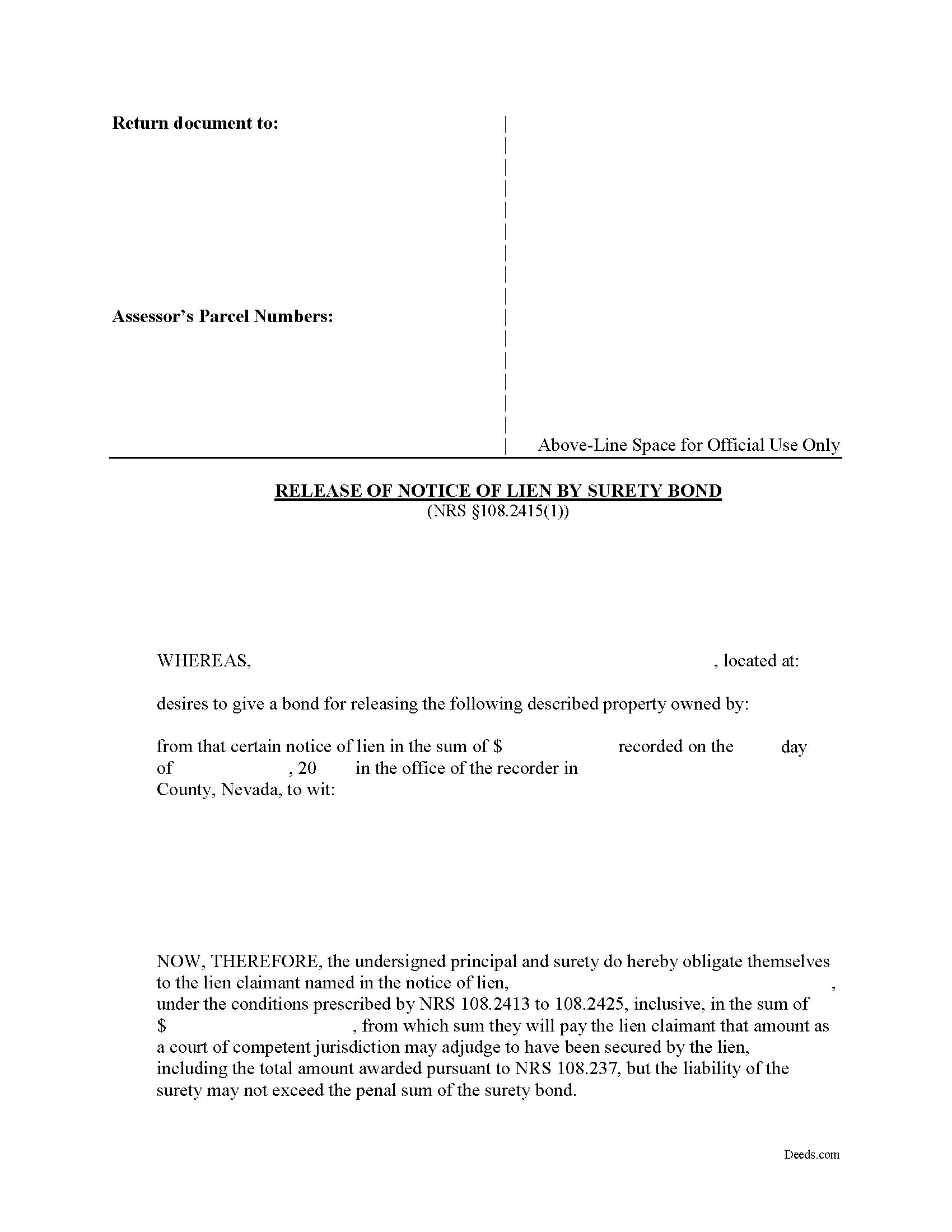
Releasing a Lien by Surety Bond in Nevada
A lien claimant's lien rights or notice of lien may be released upon the posting of a surety bond in the manner provided in NRS 108.2415 to 108.2425, inclusive.
The Release of Notice of Lien by Surety Bond is used to obtain the release of a lien for which a Notice of Lien has already been recorded against the property. In order to obtain a lien release, the principal and a surety must execute a surety bond in an amount equal to 1.5 times the lienable amount in the notice of lien. Once the Release has been recorded, the lien claimant has 10 days to cause the lien to be released or discharged by filing a Discharge of Lien. After you obtain the surety bond, you may file a petition with the District Court requesting the release of the lien pursuant to the bond.
Contact an attorney with questions about using surety bonds to release mechanic's liens.... More Information about the Nevada Release of Notice of Lien by Surety Bond
Release of Prospective Lien by Surety Bond
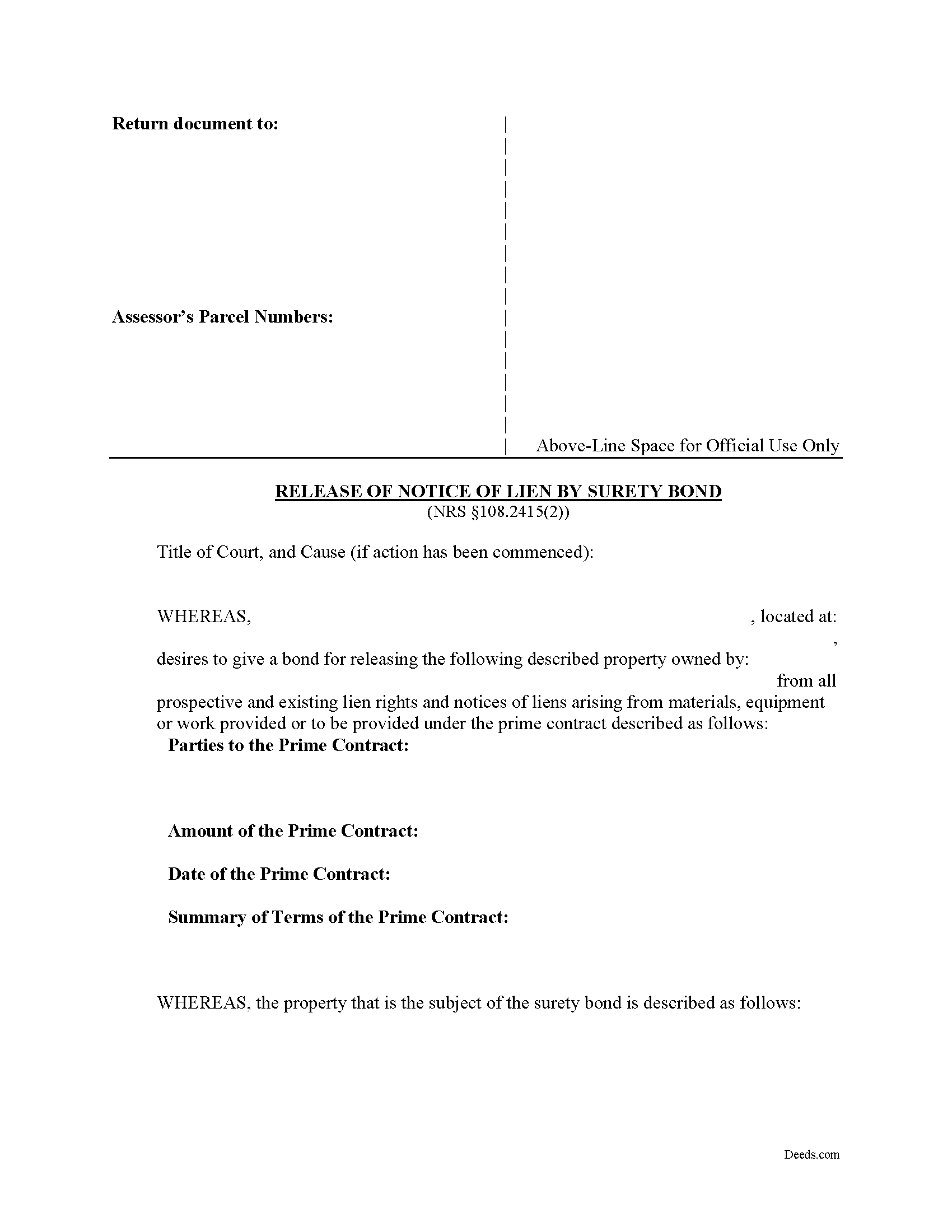
Releasing a Notice of Right to Lien by Surety Bond in Nevada
The Release of Notice of Lien by Surety Bond is used to obtain the release of all prospective and existing lien rights of lien claimants related to a work of improvement. Under NRS 108.2415(2), to obtain such a release, the principal and a surety must execute and record a surety bond in an amount equal to 1.5 times the amount of the prime contract. So, for example, if the lien amount is for $1,000, bond must be posted for $1,500.
The surety bond release form must include: the title of court and cause of action (if a lawsuit has been filed), name and address of the principal (person giving the bond), the owner's name, and information about the prime contract including parties, amount, date executed, and a summary of the terms.
The principal must record the surety bond in the office of the county recorder in the county in which the property upon which the improvement is located, either before or after the commencement of an action to enforce the lien.
By properly completing and recording this document, the bond becomes a security substitute for any existing or prospective lien on the owner's property.
Cont... More Information about the Nevada Release of Prospective Lien by Surety Bond
Unconditional Waiver upon Progress
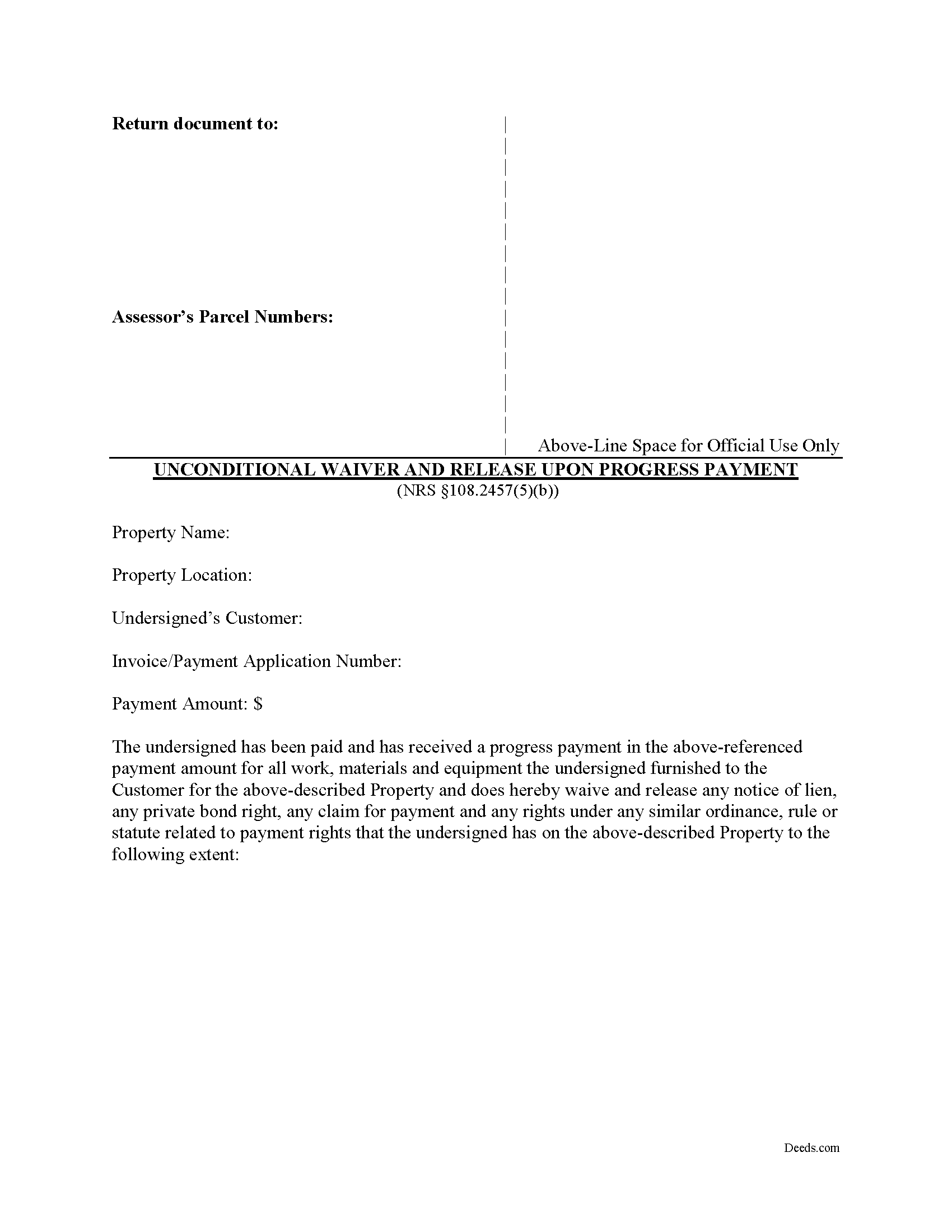
Nevada Unconditional Waiver upon Progress Payment
Provided under NRS 108.2457(5)(b), this waiver releases all claimant rights through a specific date unconditionally, even if the checks were returned or had stopped-payment orders. Because this is an unconditional waiver, only use it when a progress payment has actually been made and received.
Contact an attorney to with questions about waivers or any other issues relating to Nevada mechanic's liens.... More Information about the Nevada Unconditional Waiver upon Progress
Conditional Waiver upon Progress
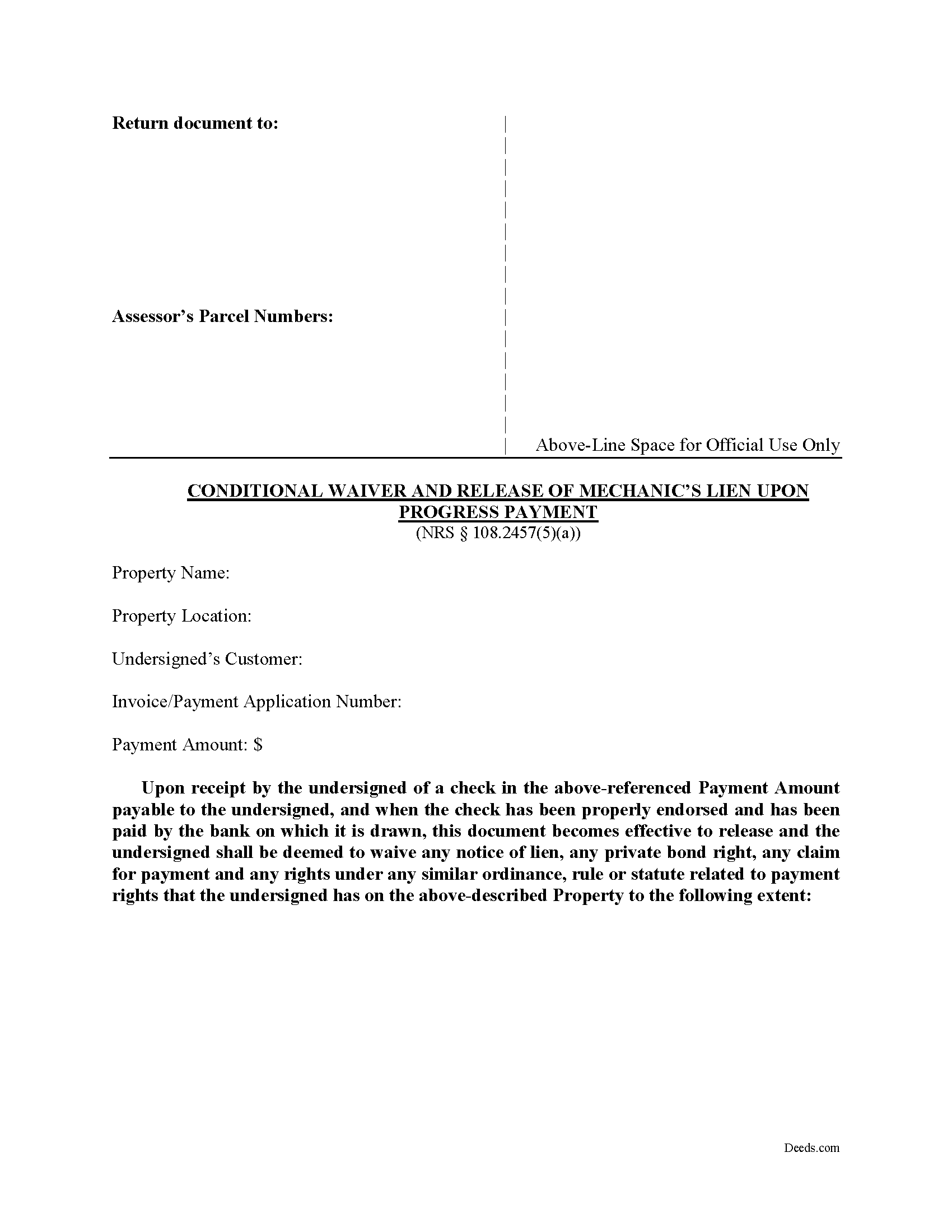
Nevada Conditional Waiver and Release upon Progress Payment
Provided under NRS 108.2457(5)(a), this waiver offers the most protection for lien claimants, because it states that if the claimant(s) have actually been paid to date (including no returned or stopped payment checks) the waiver serves as effective proof against any lien claim on the property. The lien is "conditioned" on receiving payment and is only waived if the claimant actually receives the payment.
By filing the form, the lien claimant represents that he or she either has already paid or will use the money he or she receives from this progress payment in order to make prompt payment in full all his or her laborers, subcontractors, materialmen and suppliers for all work, materials or equipment that are the subject of this waiver and release.
Getting a lien waiver also allows property owners to shield the title to their property from the general contractor, material supplier and every subcontractor involved with a project. By releasing the lien upon a progress payment, the property owner once again has clear title and can obtain financing or sell the property.
The property owner should require lien and labo... More Information about the Nevada Conditional Waiver upon Progress
Unconditional Final Waiver of Lien
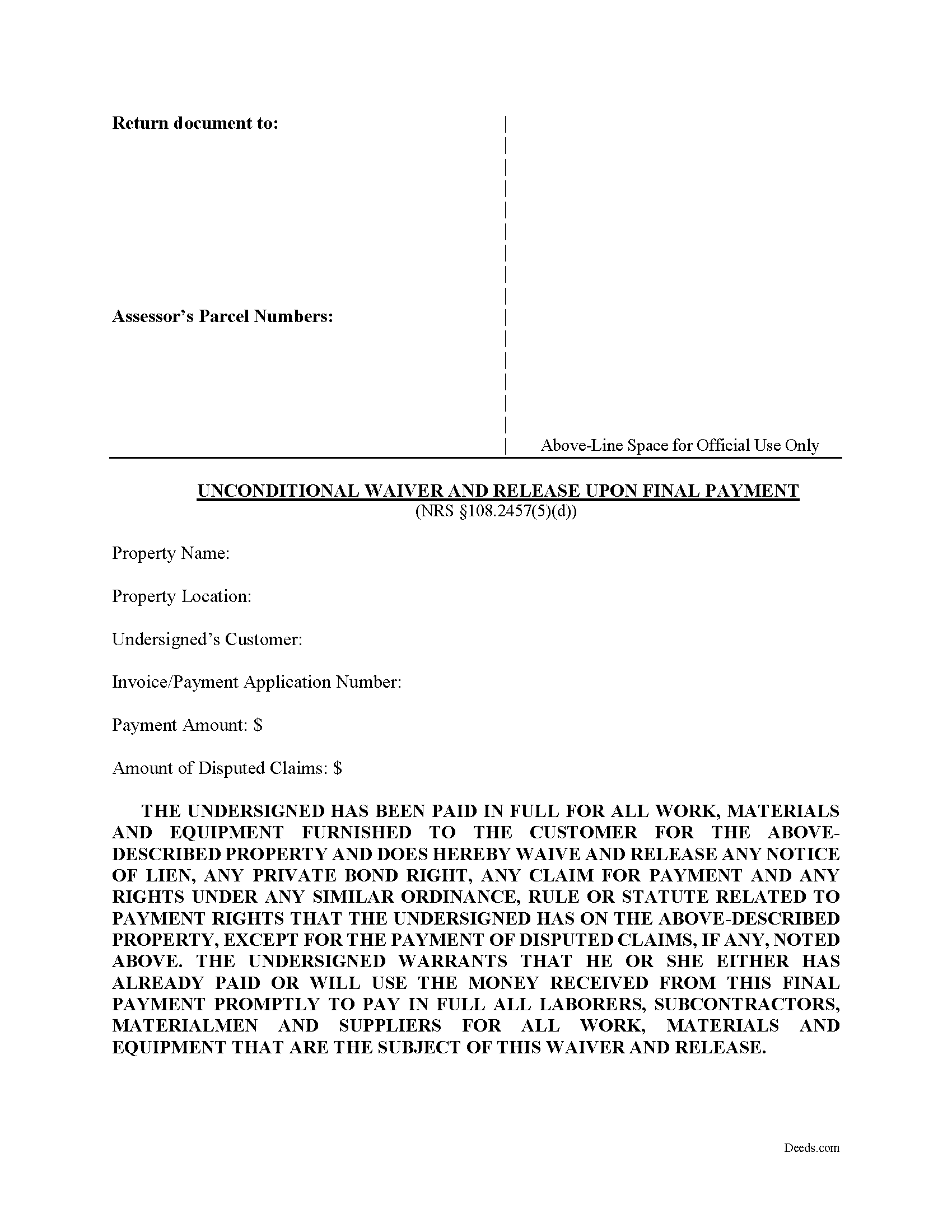
Nevada Unconditional Final Waiver of Lien upon Final Payment
Pursuant to NRS 108.2457(5)(d), this waiver releases all rights of the claimant to place a mechanics lien on the owner's property unconditionally, even if the payment check has been returned or a stop payment order was issued. As such, claimants should issue this type of release only when they are positive their work is done and the payment has cleared their bank. Owners should demand this release when they have paid in full.
Contact an attorney with questions about this document or other issues related to Nevada mechanic's liens.... More Information about the Nevada Unconditional Final Waiver of Lien
Conditional Final Waiver of Lien
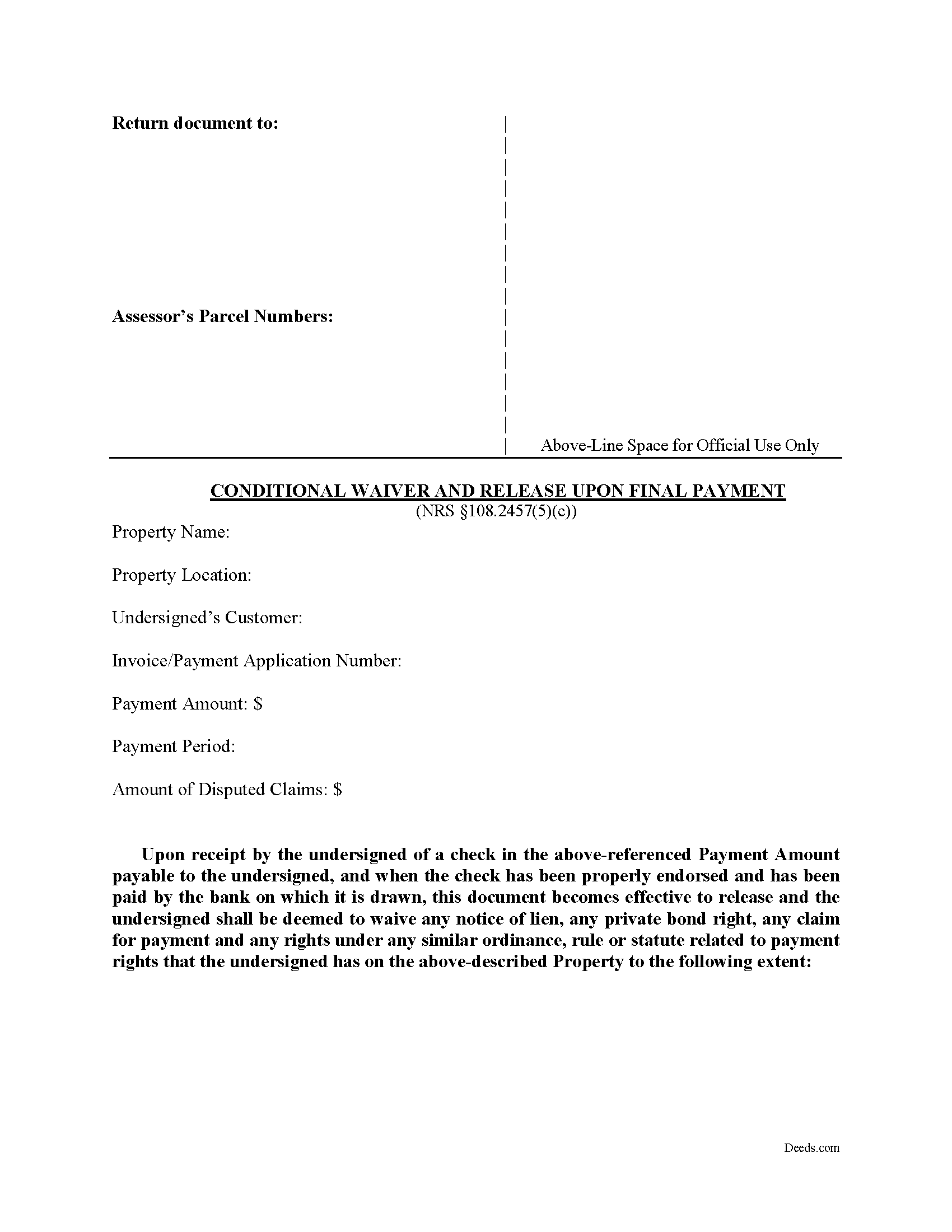
Nevada Conditional Waiver upon Final Payment.
Under NRS 108.2457(5)(c), lien claimants use this form when a required by the client to execute a waiver and release in exchange for or to encourage a customer to make payment of a final billing. The lien claimant is not paid in exchange for the waiver and release (or a single payee check or joint payee check is given in exchange for the waiver and release), so the lien is not actually waived until final payment clears, not including any disputed amount.
Contact an attorney with questions about lien waivers or any other issue related to mechanic's liens in Nevada.... More Information about the Nevada Conditional Final Waiver of Lien
Lis Pendens
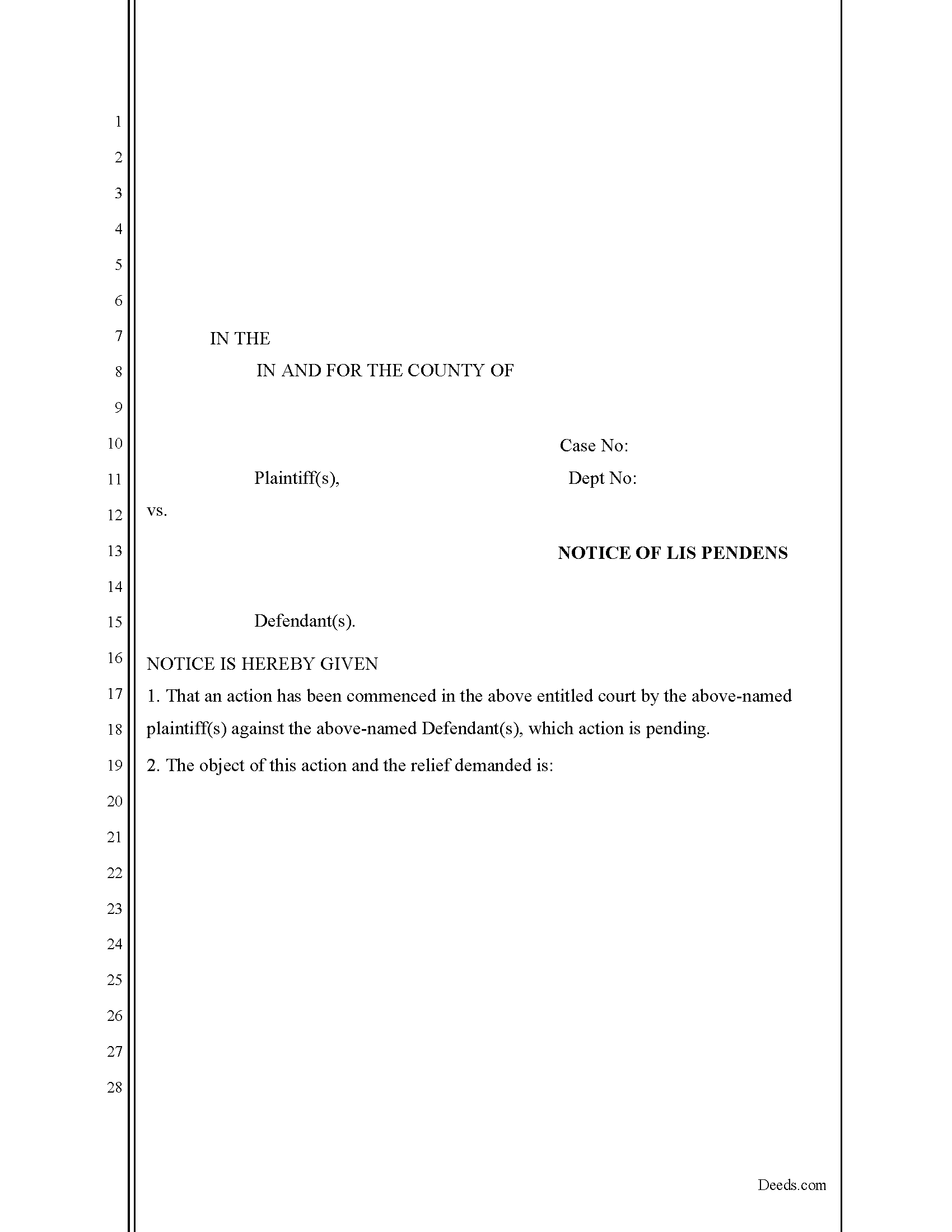
A Lis Pendens is filed when an action affects (title or possession of real property.) Filed by the plaintiff [party initiating action] (at the time of filing the complaint) and defendant [party defending action] (at the time of filing his or her answer, if affirmative relief is claimed in the answer.) The Lis Pendens document is recorded at the County Recorder's Office, where the property is located. NRS 14.010
The Lis Pendens Notice contains:
1. (the names of the parties)
2. (the object of the action)
3. (a description of the property in that county affected thereby)
4. (the defendant shall also in the notice state the nature and extent of the relief claimed in the answer) NRS 14.010
The Notice of... More Information about the Nevada Lis Pendens
Lis Pendens Release
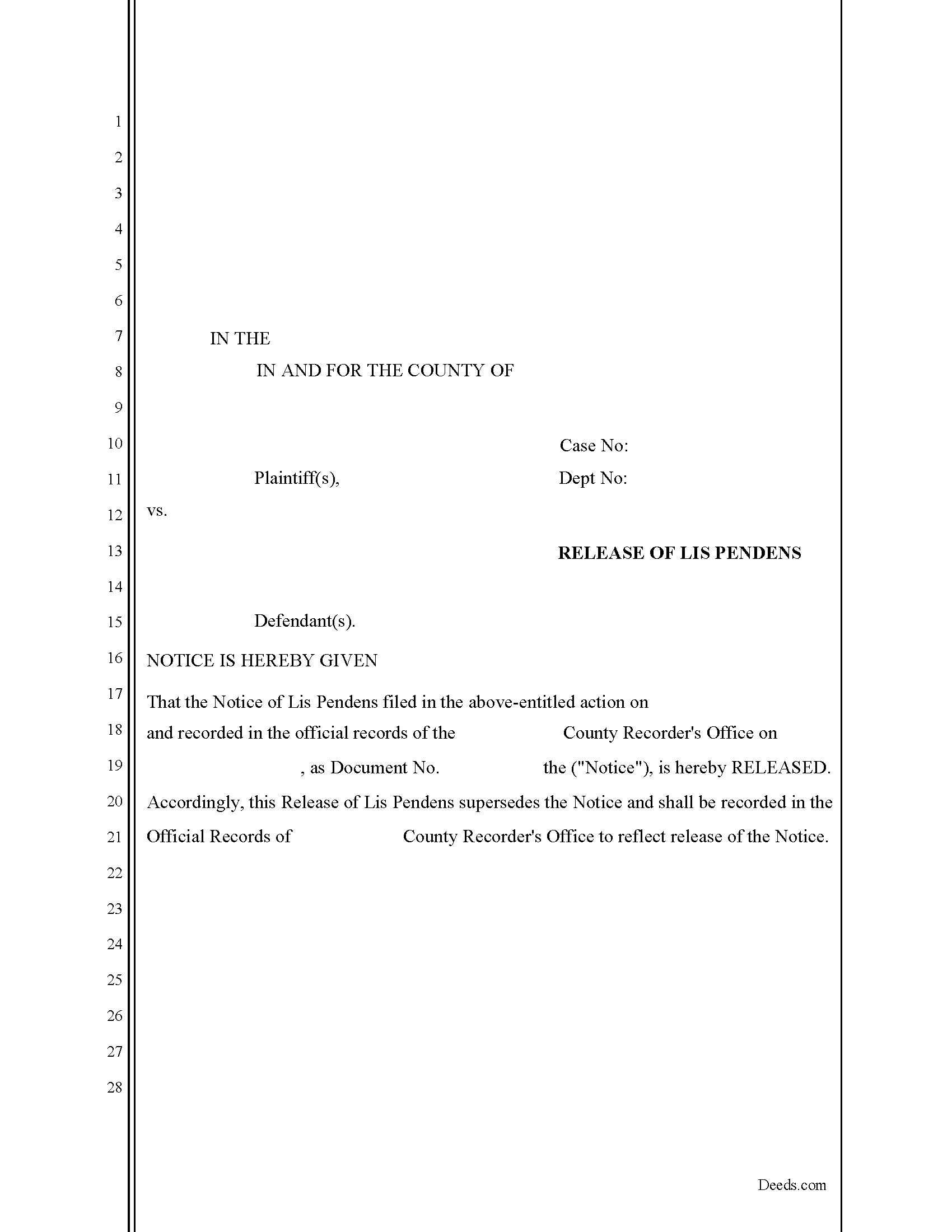
The court can determine that a Lis Pendens doesn't meet certain criteria and order a cancellation of such. At this time the Court (shall order the party who recorded the notice to record with the recorder of the county a copy of the order of cancellation. The order must state that the cancellation has the same effect as an expungement of the original notice.) NRS 14.015
(Nevada LPR Package includes form, guidelines, and completed example)... More Information about the Nevada Lis Pendens Release